


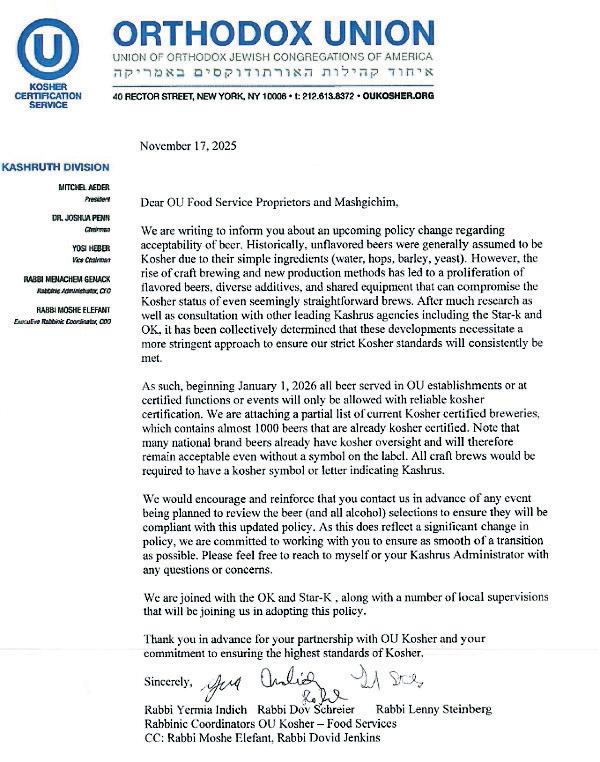






New York state assemblyman Zohran Mamdani’s ascent to political prominence as the mayor-elect of New York City has illuminated the fault lines long running beneath the surface of American Jewry. To even refer to it as a single “community” is, by now, an anachronism. What was once a network of shared fate and memory has splintered into ideological camps, each convinced the other has betrayed the essence of Jewish life in America. American Jewry’s vulnerability now exists on two levels: internal and external.
Internally, the community is fracturing along three intertwined axes — support for Israel, level of religious observance and political orientation.
Once a bastion of liberal values and progressive ideals, Jewish progressives now find themselves unwelcome in spaces increasingly hostile to Jewish identity, especially when expressed through support for Israel and Jewish self-determination. Meanwhile, conservative Jews find little refuge on the right, where extremist antisemitic currents, once confined to the margins, have been inching into the mainstream.
The ordinary rhythms of Jewish communal life now unfold with a kind of surreal dissonance. Spreadsheets circulate tallying
Synagogue listservs and WhatsApp groups have become political battlegrounds.
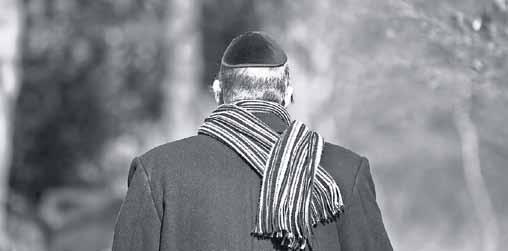
which rabbis signed which open letters about Mamdani’s candidacy — and yes, there is both a liberal and a conservative version — with congregants refusing to attend the services of a rabbi who signed the “wrong” one.
Synagogue listservs and WhatsApp groups have become political battlegrounds. The question of whom to invite to the Shabbat table now hinges on one’s opinion of Mamdani. The very spaces meant to foster belonging are now defined by estrangement.
Yet these internal fractures are magnified by a more alarming external shift: the crystallization of a bipartisan front increasingly hostile to Israel. Events of the past few weeks alone suggest that positions once relegated to the political fringe — anti-Israel, and at times, openly antisemitic — are moving closer to the center in both major parties.
On the Democratic side, Mamdani’s victory as the party’s nominee for mayor of New York City marks a turning point. Despite credible reports from the Institute for the Study of Global Antisemitism and Policy linking select campaign donors to the Muslim Brotherhood, posing
for selfies with an unindicted co-conspirator of the 1993 World Trade Center bombing and proclaiming admiration for the “Holy Land Five” — individuals convicted of funneling $12.4 million to Hamas — Mamdani nonetheless enjoys the backing of prominent mainstream figures such as presidential candidate Kamala Harris and Vermont Sen. Bernie Sanders.
His rise signals that anti-Israel positions no longer incur political cost within progressive circles; they may, in fact, confer political capital.
On the Republican side, a parallel shift is unfolding. At a recent Turning Point USA conference, Vice President JD Vance entertained questions about America’s relationship with Israel that dripped with antisemitic undertones — asking why the United States “owed Israel anything,” given that “their religion does not agree with ours.” His response emphasized “national interest” over shared democratic values or historic alliances.
Soon after, former Fox News host and current conservative media figure Tucker Carlson, who termed Christian Zionism a “brain virus,” hosted on his program far-right activist Nick Fuentes
— a white supremacist, neo-Nazi and Holocaust denier. When Carlson was criticized, Kevin Roberts, head of the conservative think tank Heritage Foundation, rushed to his defense. The Heritage Foundation is particularly known for publishing “Project Esther,” a national strategy to combat antisemitism.
Taken together, these episodes mark a bipartisan normalization of antisemitic and anti-Israel sentiment that once lingered at the edges of public discourse. On both the left and the right, antipathy toward Israel is being reframed — on one side as moral virtue, on the other as nationalist authenticity.
The first casualties of this realignment are American Jews themselves.
Those on the left feel exiled from movements they helped build. Those on the right feel unsafe among allies who trivialize or excuse antisemitism. The result is a community adrift — politically, spiritually and morally — at the very moment when solidarity is most needed.
For Israel, the implications are profound. Jerusalem must resist the temptation to align itself exclusively with one American party or ideological camp. Instead, it should nurture channels of dialogue with American Jews across the spectrum — both institutional and grassroots.
Such engagement serves a dual purpose: to fortify Jewish identity and resilience amid rising hostility, and to foster within Israel a deeper understanding of how it might support the continued vitality of American Jewry.
The survival and flourishing of Jewish life in America cannot depend on the favor of transient political winds, nor can it retreat into sectarianism. The task now is to recover a sense of shared destiny — rooted not in unanimity of opinion, but in the recognition that Jewish life, wherever it unfolds, remains bound by a moral covenant older and deeper than any party line.
Rachel Suggs is a researcher on the Jewish diaspora at MIND Israel.
Write: Columnist@TheJewishStar.com

Jewish communal organizations, especially the network of Jewish Community Relations Councils (JCRCs), are long overdue for serious self-examination. For years, these institutions positioned themselves as the moral compass of the Jewish community, promoting expansive immigration policies, including from Muslim countries, as a matter of unquestionable principle.
However, in doing so, they substituted ideological reflex for strategic responsibility. They celebrated their own humanitarianism while failing to assess how the political, cultural and
Organizations refuse to acknowledge how they themelves contributed to the problem by aiding the importation of worldviews targeting Jews and Israel.
ideological backgrounds of the Muslim immigrant populations they supported might intersect with the specific vulnerabilities of American Jews. This gap between rhetoric and reality is now impossible to ignore.
HIAS, once the Hebrew Immigrant Aid Society but now simply “HIAS,” illustrates this drift. Founded in 1881 to rescue Jews fleeing persecution from Russia and Eastern Europe, it played a heroic role throughout the 20th century. But as Jewish immigration waned, the organization reinvented itself, shifting toward a general refugee-assistance model, compensated on a percapita basis by the federal government.
Today, much of HIAS’s work involves resettling people from Muslim countries where attitudes toward Israel and the Jewish people, not to mention toward American values, have been shaped by centuries of antisemitism. Regardless of whether or not the shift from supporting Jews to supporting Muslims was guided by admirable humanitarian instincts or financial considerations, HIAS has refused to address how its transformed mission endangers Jewish communal security today.
The JCRCs as well not only supported this transformation but turned it into a moral banner. They dismissed internal dissent as narrowminded, insisting that “Jewish values” required an uncritical stance toward immigration policy and calling those who raised questions “racists.”
They, too, failed to analyze how the antisemitism Muslim immigrants brought with them would enter American civic life through activist networks, university movements, unions, local politics and general society. They ignored how
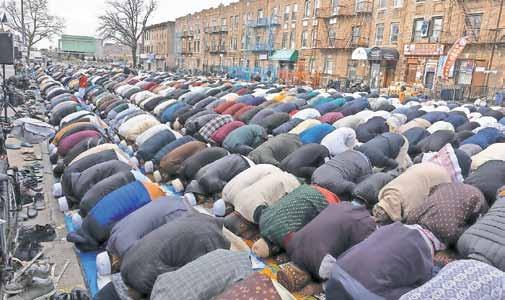
these dynamics would overlap with foreignfunded campaigns seeking to delegitimize Israel and reshape American political culture. In doing so, they neglected their core obligation: safeguarding the well-being of the communities they claim to represent.
And the direct result of this failure has brought us the far-left Muslim-led “Squad” in the House of Representatives and New York City
mayor-elect Zohran Mamdani, a Muslim Democratic Socialist and hater of Israel. And more antisemitic Muslim politicians are on the way.
Adeeper failure — arguably, the most damaging — has been the self-congratulatory refusal of JCRCs and allied agencies to address how these immigration patterns have coincided with the rise of Jew-hatred. For years,
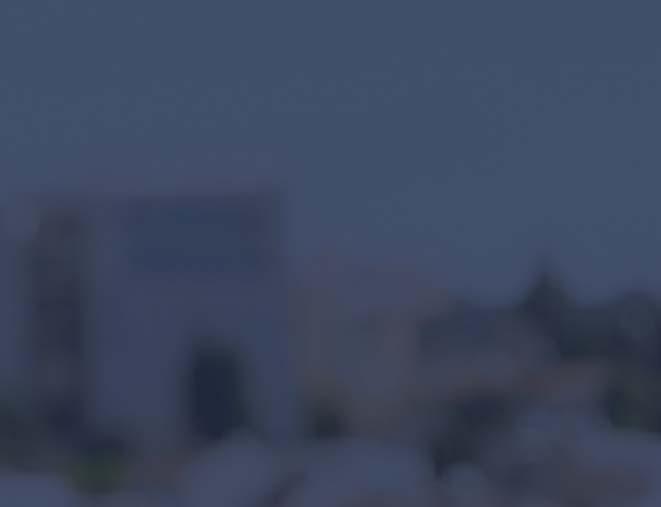












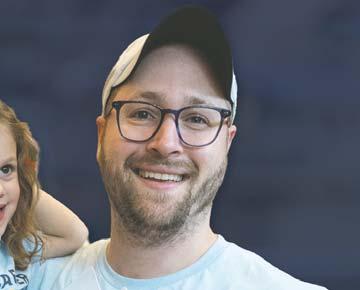









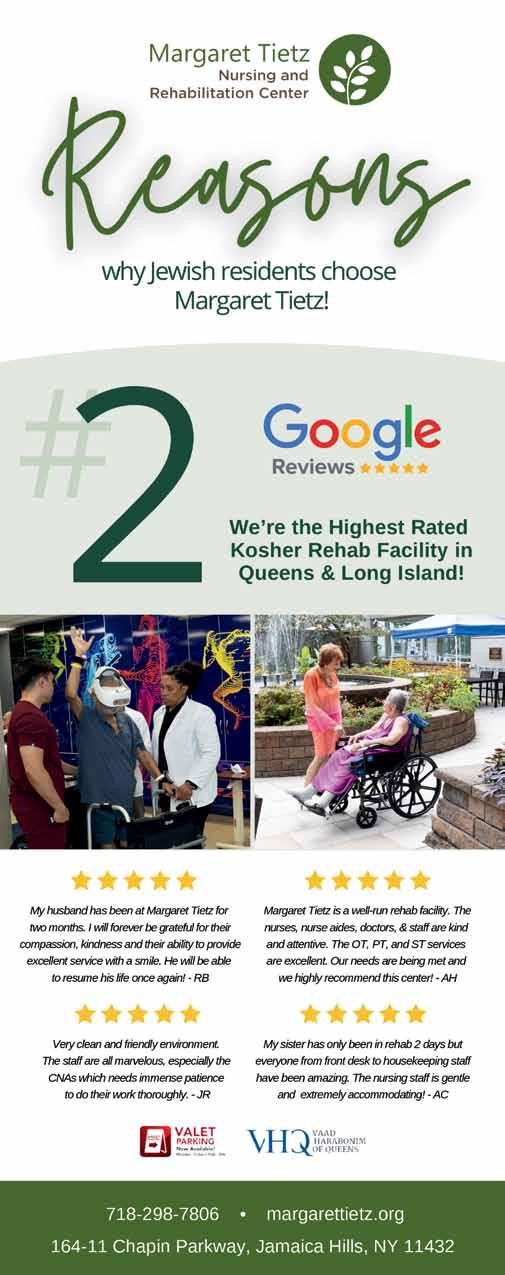
By Steve Linde, JNS
On a crisp November morning in Zambia’s capital, medicine and diplomacy intertwined when Israeli President Isaac Herzog stood alongside Zambian leaders to pay tribute to an extraordinary bond — the work of Save a Child’s Heart (SACH) in treating Zambian children born with serious heart defects as well as training a new generation of local cardiac specialists.
Herzog’s two-day visit to Lusaka, where President Hakainde Hichilema hosted him, highlighted the growing ties between Israel and Zambia — most tangibly in health.
“We work together in many areas … and many Zambians know that Israeli doctors are treating our young cancer and heart patients,” Hichilema said. “We deeply appreciate the work they do.”
Herzog reaffirmed his commitment to share SACH’s mission. “It’s an expression of affection and love for Zambia, and great human beings are obeying a huge Jewish rule: if you save one person, you save a whole world,” he said. “If you save one child’s heart, you are saving an entire universe. This is something incredibly Jewish in terms of tikkun olam and also in terms of our deep alliance with Zambia.”
The event ended on an emotional note when Kachese Syapiila, 16, a Zambian boy whose life was saved by Save a Child’s Heart surgeons in a heart operation on July 11, 2024, stepped forward and said: “I am one of the patients who was helped by SACH through the National Heart Hospital. I was in Israel last year from June to August.”
Herzog asked, “How did we treat you?” Kachese replied, “Amazing!”
Save a Child’s Heart, a humanitarian organization that provides cardiac healthcare to children worldwide, was founded in 1995 and is based at the Wolfson Medical Center in Holon. Since its establishment, SACH said in a press release, it has saved more than 8,000 children from 75 countries, and its work in Zambia is a cornerstone of its mission.
SACH has treated 136 Zambian children, 29 in 2025 alone, and 14 more scheduled before year’s end — bringing the total to 150 by December.
The NGO’s efforts go well beyond flying patients to Israel. Through sustained training programs, SACH has helped to build a world-class Zambian cardiac team. One striking success story is Dr. Musa Kalembe Lwara, Zambia’s first pediatric cardiac intensive-care specialist. Lwara completed a three-year fellowship in Israel at Wolfson Medical Center, where he trained alongside Israelis in life-saving specialties.
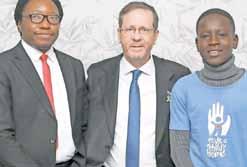
When Lwara addressed Herzog, he greeted the president in Hebrew, “Ma nishma?” (How are you?) Herzog replied, “Beseder” (I’m fine), both laughing at the unusual exchange. Lwara recently returned to Zambia to apply his skills as part of the national pediatric cardiac team.
Dr. Agnes Mtaja, the medical director of the National Heart Hospital (NHH) in Lusaka, noted that over 150 Zambian children had already received treatment in Israel through SACH’s missions and stressed the continued need: “Every year, around 6,000 children are born in Zambia with congenital heart conditions. There is no room for slowing down.”
In recognition of SACH’s role, the press release release, the partnership has now grown even deeper. The organization, in collaboration with the Zambian Health Ministry and the American Jewish Committee, is funding a stateof-the-art heart-lung machine — a $200,000 investment that will help NHH perform more cardiac surgeries independently, without requiring children to travel abroad.
Simon Fisher, the executive director of SACH, traveled with the Israeli president to Zambia, participating in high-level meetings aimed at expanding medical cooperation and strengthening pediatric cardiac services in the country, which has a population of almost 22 million.
“Sitting with President Herzog and listening to Zambian health leaders speak of their experience — after years of partnership, trust and real progress — was deeply moving,” Fisher said. “We look forward to continuing the program’s growth and returning to Zambia in December once the new heart-lung machine arrives — hopefully in time for Christmas.”
As Herzog left Zambia, six more Zambian children departed for Israel for life-saving heart surgeries, accompanied by Dr. Sara Musalale, an anesthesiologist from Zambia who is joining SACH’s advanced medical fellowship program in anesthesiology.


FRIDAY, NOVEMBER 28TH

SATURDAY, NOV. 29TH: 7PM-MIDNIGHT
SUNDAY, NOVEMBER 30TH

By Mike Wagenheim, JNS
President Donald Trump said that both Israel and Saudi Arabia are “great” allies, as he confirmed that the United States would sell Riyadh F-35 fighter jets that are “pretty similar” to those that Israel operates.
Trump made the comments during an Oval Office session with reporters on Tuesday alongside Saudi Crown Prince Mohammed bin Salman. Trump said that Israel is aware of the arrangement, which he first announced in broader terms on Monday.
Israel would “like you to get planes of reduced caliber,” Trump told the Saudi prince, as reporters looked on. “I don’t think that makes you too happy.”
“As far as I’m concerned, I think they are both at a level where they should get top of the line,” Trump said of Jerusalem and Riyadh. “We’re going to have a deal. They’re going to purchase F-35s.”
Trump would not confirm reports that Israel requested that he condition the F-35 sale to Riyadh on the kingdom normalizing diplomatic relations with Jerusalem.
All Trump would say about the emerging sale to Saudi Arabia is that “Israel is aware, and they’re going to be very happy.”
Details about the potential sale of the F-35s remain scarce. Israel is the only US ally in the Middle East to have access to the advanced technology.
Bin Salman said on Tuesday that Riyadh will “definitely help” pay for the reconstruction of Gaza, though an
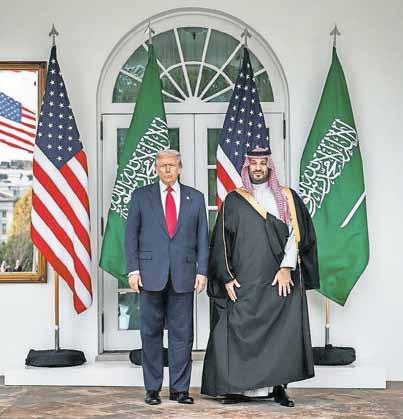
exact figure has not yet to be finalized.
Trump said that “it’ll be a lot.” He added that “the Palestinians are doing very well” and that “we’re working very closely with a lot of people that make everybody happy, including Israel, the Palestinians and everybody.”
Of a path to Saudi normalization
with Israel, bin Salman said that he and Trump had a “healthy discussion” on the subject and that Riyadh wants to join the Abraham Accords with “a clear path” toward a two-state solution.
“We’re going to work on that to be sure that we can prepare the right situ-
ation as soon as possible to have that,” bin Salman said.
Trump said that he didn’t want to describe it as a “commitment, but we’ve had a very good talk on the Abraham Accords.”
“We talked about one state and two state,” Trump said, without explaining what he meant by “one state.”
The president added that he and the Saudi prince would discuss the topic further and that bin Salman has “a very good feeling toward the Abraham Accords.”
Bin Salman sounded non-committal in his remarks to reporters. “We want peace for the Israelis. We want peace for the Palestinians,” he said. “We want them to coexist peacefully in the region.”
Trump and bin Salman also said that Iran could be brought into the fold.
The president said that Tehran “would very much like — I mean, they may say something else, but they would very much like to have a deal” with the United States, after Washington’s attack on Iranian nuclear facilities this summer.
“I think we’ve done a great job in wiping out the nuclear capacity of Iran. Nobody else could have done that. No other president would have done it,” Trump said.
Bin Salman said that Washington and Riyadh “are working closely together on that issue.”
“We would do our best to help to reach a deal between America and Iran, and we believe it’s good for Iran’s
future to have a good deal that would set the path for the region and the world and America,” the prince said. “We will do our best to see that day happen.”
Trump pushed back heavily on questions to bin Salman about Saudi involvement in the Sept. 11, 2001 terror attacks on the United States and bin Salman’s reported involvement in the brutal murder of dissident journalist Jamal Khashoggi, which pushed bin Salman into pariah status for years.
“I feel painful about 9/11 families in America, but we have to focus on reality,” bin Salman said, of relatives of victims of the attacks protesting his visit. “The reality is that Osama bin Laden used Saudi people at that event for one main purpose, which is to destroy the American-Saudi relation.”
“That’s the purpose of 9/11,” the prince said.
Bin Salman told reporters that “it’s really painful to hear about anyone who is losing his life for no real purpose,” speaking about Khashoggi.
“It’s been painful for us in Saudi Arabia. We did all the right steps of investigation in Saudi Arabia,” he said. “We’ve improved our system, and it’s painful and it is a huge mistake and we are doing our best that this doesn’t happen again.”
Trump insisted on Tuesday that bin Salman knew nothing about the 2018 slaying and dismemberment of Khashoggi inside the Saudi consulate in Istanbul, although Trump’s intelligence apparatus disputed that in his first term in office.
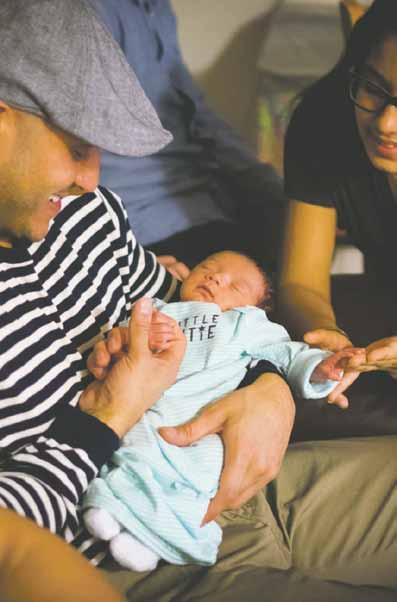




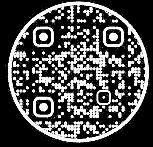

By Ariel Kahana, Israel Hayom
New York City’s outgoing Mayor Eric Adams is urging Israeli Prime Minister Benjamin Netanyahu to travel to the city despite Mayorelect Zohran Mamdani’s threat to arrest him. Mamdani will be “mayor, not emperor,” Adams said.
The goal of Netanyahu’s trip would be to reassure nervous New York Jews.
Speaking during a visit to Israel late last week, Adams said in an interview with Israel Hayom: “I believe the prime minister should visit the city. I think he should start with the inauguration ceremony of Mamdani in the presence of the City Council on Jan. 1 to send a strong message to the largest Jewish community outside Israel.
“He needs to make clear to the entire community that he will continue visiting the city as often as possible, and he should begin on Jan. 1.”
Adams arrived in Israel for a farewell visit after leaving an office he had held since January 2022. With polls showing he had no chance of winning, he withdrew from the Nov. 5 race to bolster Andrew Cuomo’s chances. That move failed and Mamdani, who rejects the legitimacy of the state of Israel and has taken other explicitly antisemitic positions, ultimately won.
Adams, who strengthened ties between New York and Israel during his four years in office and en-
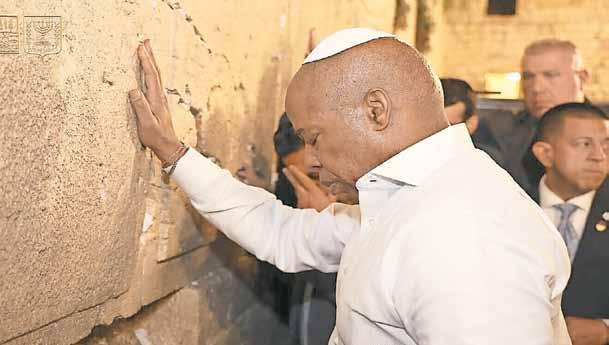
joyed strong support from the Jewish community, made it clear in the interview that he intends to continue along the same path.
Q: What future do you see for ties between New York and Israel in the coming years?
A: I think many of us are disappointed by the election results. But we must not in any way allow the energy coming from the victory of the Democratic Socialists of America and Zohran to do anything that damages the atmosphere for Jewish
New Yorkers or the relationship between Israel and the city.
Mamdani has already declared that he intends to advance several initiatives, such as canceling the International Holocaust Remembrance Alliance definition of antisemitism, as well as the possibility that he will shut down our Office for the Prevention of Antisemitism.”
In response, we will call on New Yorkers to stand up and declare clearly that hatred has no place in our city. We will remain vigilant. I
will no longer be mayor, but I am not going anywhere. I intend to continue the work I have done for many years surrounding issues of hate in general and antisemitism in particular.
Q: How will New York be affected if he does what he says he will do, such as severing all ties with Israel?
A: He must work with additional government authorities to implement many of the decisions and policies he has announced.

The Jewish Star is seeking a new editor who will be responsible for expanding local news coverage, recruiting and managing staff and freelance contributors, and editing and enhancing material from The Star’s wire services — all while maintaining the highest Jewish and journalistic standards.
This full-time in-person or hybrid position (starting at $45k-65k) offers Jewish
holidays, vacation, health insurance, and 401k.
Candidates should have news reporting and editing experience, an understanding of what interests Modern Orthodox Jewish communities, and a drive to excel in a professional, collegial environment.
While our primary competitors emphasize one-dimensional and biased political
As far as I understand, the investment comptroller has made clear he does not intend to withdraw our pension funds from Israeli companies or funds. Other members of Mamdani’s administration do not support these moves. He will therefore have to navigate the role of mayor while coordinating with other layers of government.
Q: You’ve said that what concerns you even more is the atmosphere Mamdani may create as mayor.
A: Does a mayor create an environment where one group is treated differently from others? Will he ignore the annual Israel Parade? Will he treat certain New Yorkers, or their way of life, differently? To that I say no. That is not New York. We must stand up and ensure that does not happen.
Q: In this context, what should Israel and the Jewish community in New York do in response to Mamdani?
A: History has not been kind when it comes to attacks on the Jewish people, from the days of Moses to what we saw in Spain under Christopher Columbus, to the ghettos in Rome and Nazi Germany. I think the time has come to say we are not going to run. We are going to fight. This must be a generation that confronts hatred. I am asking New Yorkers to join me as I take a firm stand and declare that we will not surrender to hate. And I am asking all Jewish New Yorkers to do the same.

coverage, The Jewish Star’s team of veteran journalists is committed to the highest professional standards — insisting on journalistic and commercial integrity and a pursuit of truth that’s grounded in an adherence to Torah values and a love of Israel.
The Jewish Star, serving diverse Modern Orthodox communities on Long Island, in Queens, Riverdale, Upper Manhatan and
Westchester, is an independent newspaper produced by Richner Communications, a 100 employee familyowned company that publishes the Pulitzer Prize winning Riverdale Press and dozens of community newspapers, websites and shopping guides.
Proudly wear your Jewish Star in a kosher environment … and help make Jewish journalism great again.
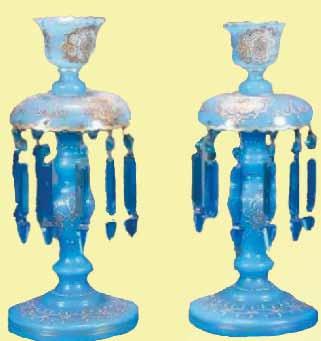








By Deborah Fineblum, JNS
Thanksgiving. They got it from us.
The evidence: Things they don’t teach you in school, like the Pilgrims modeling their autumn thanksgiving holiday after the Jewish harvest holiday of Sukkot, celebrated just a few weeks earlier.
This is actually not surprising considering that the Pilgrims — goofy hats and all — modeled their society after the ancient Hebrews. To the point that they actually learned Hebrew, including while afloat on the Mayflower.
“Look on the back of a draft of the Mayflower Compact, and you see the EnglishHebrew worksheets they were studying at the time,” says author, historian, commentator Sha’i ben-Tekoa. In fact, says ben-Tekoa, the Pilgrims saw themselves in distinctly biblical terms. “They believed that in settling the new land, they were like the Israelites crossing into the Promised Land.”
What’s more, another meaning of hodu, the Hebrew word for “turkey,” is to thank — a word that appears many times in the Torah.
In fact, the founding fathers were thinking of declaring Hebrew as one of the country’s official languages, alongside English. What’s more, Thomas Jefferson, Ben Franklin and John Adams considered having the official seal of the new country feature Moses leading the Jews across the Red Sea. “Early America was drenched with the Hebrew Bible,” he adds. “So American fascination for and support of Israel started back then.”
From the start, American Jews saw their religious identity and their national one as two halves of a coherent whole.
It’s “the belief that Judaism and Americanism reinforce one another, the two traditions converging in a common path … an ongoing effort on the part of American Jews to interweave their ‘Judaism’ with their ‘Americanism’,” Jonathan Sarna, the Joseph H. and Belle R. Braun Professor of American Jewish History at Brandeis University wrote 20 years ago in “The Cult of Synthesis in American Jewish Culture.”
And the synthesis in question often peaked on Thanksgiving, writes Sarna. On Thanksgiving of 1844, Isaac Leeser, the chazzan at Mikveh Israel in Philadelphia, told his congregants that “as Israelites, we have an additional cause of thanksgiving” and went on to detail “America’s special meaning for the Jew.”
Nearly eight decades later, in 1922, “America and the Jew: A Pageant for Thanksgiving Day,” debuted at Boston’s Temple Israel as performed by the Sunday-school children, reports Sarna. The play, which told the story of the “joyful harvest,” was seen by 1,200 people who were impressed, Rabbi Harry Levi reported at the time, with “its emotional appeal and religious effectiveness.” And over the years, it made the rounds of several other Reform congregations around the country.
The attitude of gratitude — or as we say in Hebrew, hakiras hatov — is a central theme in Judaism. Consider: The matriarch Leah gave the name Yehuda to her fourth son, meaning “Now I will thank G-d,” which is how the Jews eventually became Yehudim (the people who thank).
In fact, opportunities to give thanks abound throughout the Jewish calendar. We’re reminded of the times of the Temple in Jerusalem when each spring, farmers would bring bikurim — baskets filled with the first fruits of their harvest — to the kohanim in the

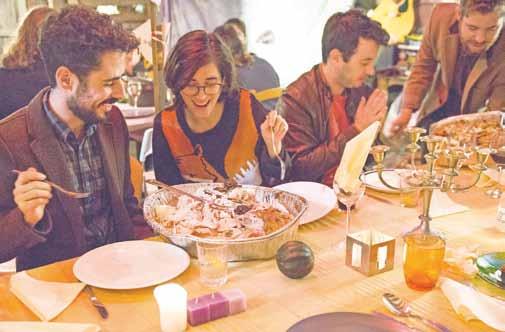
Holy Temple in gratitude for abundant crops. And many an animal was sacrificed as a peace offering, one given (and the meat shared between the one who brought the sacrifice and the kohanim) from a heart filled with gratitude for God’s bounteous gifts for surviving a dangerous ordeal or after successfully fulfilling a vow.
“When you’re a traditional Jew, gratitude is baked into prayer from the moment we wake up,” says Erica Brown, director of the Mayberg Center for Jewish Education and Leadership at the George Washington University in Washington, D.C. “Blessings over food and aspects of nature make us conscious of everyday gratitude and create a structure for thanks.”
And for Jews, Thanksgiving is a guilt-free holiday (at least, if you resist the urge to overeat).
“Here in the United States, Thanksgiving is
one of the few legal holidays without paganism or other religious overtones,” says Rabbi Chaim Wolosow, co-director of the Chabad Center of Sharon, Mass., “so all those who are wary of the other Christian holidays can truly enjoy this one since it’s completely pareve.”
In fact, some families simply postpone the turkey, the stuffing and the cranberry sauce for 24 hours and celebrate a Shabbat Thanksgiving on Friday night.
And because the holiday has no overt religious overtones, Americans of varying faiths are able to celebrate it together. For the last 15 years, members of Congregation Beth Shalom in Wilmington, Del., have joined with those from area churches and mosques the Tuesday before Thanksgiving to break bread together (hold the turkey; this is a vegetarian affair), fundraise for local food banks and share gratitude-themed readings from their scriptures.
For Rabbi Michael Beals, Psalm 100 always comes to mind. “How do we serve God with joy?” he asks. “It’s with gratitude. Coming together strengthens what we have in common, which is so much more than what separates us. And the thing that best connects us is gratitude.”
“It’s a melting pot, America, and the Jews who came were grateful the country protected their freedom of religion,” says Rakel Berenbaum, whose “Portion from the Portion” column, with its parshah-related recipe, is a staple of the Orthodox Union’s Torah Tidbits magazine.
And since today’s Jews have ancestors from all over, she suggests an international potluck Thanksgiving. “The Persians can bring their rice and the Russians their sauerkraut. That way, we learn about Jewish culinary traditions from around the world, and best of all, no one person has to do all the cooking.”
Brown has an observation … and a suggestion.
“With today’s Thanksgiving so dominated by food and football, we often minimize the thanks because we lack a structure for it,” she says.
To focus the celebration on the holiday’s true meaning — with a Jewish flare — Brown opts for creating a pre-turkey gratitude conversation by hiding a question under each dinner plate to be answered before the main course.
Here are a few of her under-plate questions to get you started and inspire you to add your own:
1. What are three things you are grateful for at work, school or in your volunteer job?
2. What are three specific things you are grateful for about your family?
3. What foods are you most grateful for?
4. What are you thankful for as an American (if you are an American)?
5. What are you most grateful for in your Jewish life?
6. What is something that once caused you pain, but that you are now grateful for?










































































































Thousands of rabbis pose for a group photo in front of ChabadLubavitch world headquarters at 770 Eastern Parkway in Crown Heights on Sunday. They are among the 6,500 rabbis and other Jewish leaders visiting New York from every US state and more than 100 countries for the International Conference of ChabadLubavitch Emissaries.


Thanksgiving is a time for gratitude — a chance to pause, reflect and celebrate the blessings in our lives. But for many families, it’s also a time of high emotions, tension and even division.
Conversations about politics, Israel or the state of the world can easily create rifts at the Thanksgiving table. For the Jewish community, these divisions often run deep, touching on personal identities, generational differences and competing visions for the future.
Yet Judaism teaches us that even amid conflict, gratitude and hope can be powerful unifiers. The Shehecheyanu is a central blessing to Judaism. It reminds us to celebrate life’s moments of newness and joy, giving thanks for the ability to reach this moment together. This prayer offers an important lesson: while we may not always agree, we can still come together to honor what we share — our values, our heritage and our collective hope for a brighter future.
Our work and other market research studies over the last year have shown that while Jews may be aware of other religions and their tenets, fewer non-Jews know about Judaism. It is a mystery, and we Jews are a mystery. Our values, however, are the cornerstone of Christianity and Islam, and, in turn, at the core of democracy and freedom.
So, perhaps it is incumbent on all of us, to remember and share the central prayers of our
faith whether we are practicing or culturally Jewish only, or maybe had a great-grandparent and incorporate them into our celebrations simply because they are universal in their thought and hope. Noncontroversial and inviting.
The Shehecheyanu is recited during moments of joy, renewal or new experiences. It reminds us to pause and give thanks for life, sustenance and the opportunity to be present in the moment.
Blessed are You, L-rd our G-d, Sovereign of the Universe, who has granted us life, sustained us and enabled us to reach this moment.
Gratitude is at the heart of both Judaism and Thanksgiving. Our core prayers, including the Shehecheyanu, are centered on the recognition of blessings in the present moment. But Jewish values extend even further, offering a framework for finding common ground in challenging times.
Hope and positivity: Judaism has always centered on hope — on believing in a better tomorrow even in the face of adversity. This is the spirit of Chanukah, where a small band of brothers — the Maccabees — protected the Second Temple against overwhelming odds, and the oil to light the arc holding the Torah lasted not one day but eight. Chanukah is a celebration of faith and resilience; it’s a reminder that light can prevail even in the darkest of times.
Gratitude for freedom: As Jews, we are profoundly grateful for the freedoms we enjoy in this country, imperfect as it may sometimes feel. We are thankful for the ability to practice our faith, express our beliefs and stand against antisemitism with the support of allies.
Unity in diversity: While we may disagree about Israel’s actions or political ideologies, we can unite around shared principles. Gratitude,

respect for life and the importance of community are values that transcend our differences and anchor us as a people.
This Thanksgiving, as families and friends gather to reflect on their blessings, we have an opportunity to infuse the holiday with Jewish values and traditions that inspire unity and understanding. Incorporating the spirit of the Shehecheyanu into Thanksgiving is one way to do this — by embracing gratitude for the present moment and the people around us, no matter our disagreements.
Here are a few ideas to consider: Express gratitude for shared blessings: Take a moment to reflect on what unites us: gratitude for family and friends who love and support us. Gratitude for the freedoms we enjoy in America, including the ability to practice our faith and share our beliefs. Gratitude for Israel, a homeland that has demonstrated resilience and innovation. Gratitude for hope, the belief that even amidst challenges, we can work towards a brighter future.
Share the miracle of hope: As Chanukah approaches, reflect on the courage of the Maccabees and the miracle of the menorah. Their
Core prayers, including ‘Shehecheyanu,’ recognize blessings in the moment.
story is a powerful reminder that no matter how divided or overwhelmed we feel, unity and resilience can lead to light and renewal.
Foster constructive conversations: Acknowledge that family members may hold different views but commit to approaching discussions with civility and respect. Gratitude for one another should be the foundation of every interaction.
Emphasize what we share across different faiths, not what divides us: Thanksgiving often brings together people of various backgrounds and beliefs. The Shehecheyanu highlights gratitude and presence in a way that resonates universally, offering a moment to reflect on shared values rather than differences.
The Shehecheyanu and the story of Chanukah remind us that gratitude is not just a feeling; it’s a practice. It’s a way of recognizing the good in our lives, even in the face of hardship. This Thanksgiving, let us embrace that practice. Let us be thankful for each other, for the values that guide us and the freedoms we enjoy, even when they feel imperfect.
As we approach the season of miracles, may we find light in the darkness, hope in each other and unity in these precious shared moments.
Write: Columnist@TheJewishStar.com
By Jackson Richman, JNS
Thanksgiving usually consists of cooking on a level that Jews do every week for Shabbat — soup, salad and all those sides that accompany the main dish.
And while chicken was never a stranger to kashrut, the turkey was initially an unknown bird, as it didn’t exist in the Old World.
In the 11th-centrury, Rashi said that only birds that had been traditionally eaten by Jews
could be considered permissible to eat.
The kosher status of the turkey, which appeared in Jewish legal literature in the 18th century, was decided primarily because the Mishnah Hullin dealt with new, unfamiliar birds. For kosher certification, birds must consist of specific physiological features: a crop, an extra toe and a muscular, thickwalled part of its stomach that is easy to peel. Additionally, kosher birds may have cer-
tain predatory manners.
Today, many Jews in Israel celebrate Thanksgiving just as do their counterparts in the United States. Each year, Israelis actually consume twice as much turkey meat as Americans.
According to Israel’s Ministry of Agriculture, Israelis eat approximately 28 pounds of turkey every year — almost double the 16.4 pounds eaten annually by the average
American.
More than that, nearly half of Israel’s turkey production is exported to Europe.
And as a last (and very important) note, the Hebrew word for “Jews,” yehudim, comes from the root of the Hebrew word hodu, or “to give thanks”; it’s also Hebrew for “turkey.”
To be a Jew is to be thankful to G-d for existence. To be an American in Israel at Thanksgiving time is to be doubly thankful.



By Amelie Botbol, JNS
“Creating art so close to the event has a certain rawness — it comes from the gut, from emotion that hasn’t yet faded or been sanitized by distance,” said Lior Chefetz, creator, writer and director of “Red Alert,” a television series recounting the horrors of the Hamas-led invasion of southern Israel on Oct. 7, 2023. “That immediacy can be an essential part of truth-telling.”
“Red Alert,” which premiered on Paramount+ on Oct. 7, tells the stories of ordinary Israelis who became heroes when Hamas terrorists invaded southern Israel, killing 1,200 people and kidnapping 251 hostages. More than two years later, the bodies of four of those hostages remain in Gaza.
Filming the series, Chefetz said, was a formidable challenge.
“The story is incredibly intense, and we had numerous large-scale scenes involving actors portraying Israeli security forces and Hamas terrorists,” he explained. “In the first episode alone, there are several gun battles set in the urban environment of the town of Ofakim.”
The production initially explored several filming locations, but logistical and safety concerns arose.
“Many municipalities were eager to cooperate at first,” Chefetz recalled. “But once they realized we were recreating actual firefights between terrorists and police, they grew concerned. There was a real fear that armed civilians might see the set, mistake it for an ongoing attack, and react — potentially leading to disaster.”
Ultimately, the production team turned to the city of Ofakim, where one of the fiercest battles of Oct. 7 took place.
“The city’s leadership embraced the project immediately,” said Chefetz. “As the mayor told us, ‘Who will tell our stories if not ourselves?’”
To ensure the safety of cast, crew and residents, the production implemented extensive precautions: blocking streets, distributing flyers to nearby homes, posting warning signs at intersections and alleyways, stationing visible security personnel in reflective vests and using drones to monitor movement around the set.
“Every few minutes, a P.A. system announced that a film was being shot,” said Chefetz. “These measures allowed us to recreate the battle scenes close to the real locations — maintaining authenticity while respecting the community.”
The decision to release the series while hostages were still being held in Gaza and the war had not yet ended sparked controversy among some Israelis. Chefetz, however, said he believed the timing was justified.
“It’s been two years since Oct. 7,” he said. “Throughout history, many powerful works of art confronting national trauma or terror have been created close to the events themselves. ‘United 93’ was made four years after Sept. 11. ‘Patriots Day’ came just three years after the Boston Marathon bombing. Picasso painted ‘Guernica’ the same year the city was bombed.”
The entire shoot was an intensely emotional


experience, said Lawrence Bender, executive producer of the series.
“There wasn’t a single person on set who didn’t have a moment during filming,” Bender said. “For example, we have a scene where a father and daughter look out their window to see a massive group of terrorists swarming into their kibbutz. Even though we were staging it, it was terrifying to watch.”
One of the stories depicted in the series is that of Bat Sheva Yahalomi, who escaped Hamas captivity with her two daughters as they were being taken toward Gaza. Her husband, Ohad Yahalomi, was wounded on Oct. 7 while defending his family, then kidnapped and murdered in captivity. Their son, Eitan Yahalomi, was abducted to Gaza and freed in November 2023.
Recalling the filming of the scene in which Bat Sheva flees from terrorists with her daughter Yael and her baby in her arms, Bender said the moment was grueling to recreate.
“They were running barefoot in the heat for a long time before finding a tree to rest under,” he said. “As we filmed, we could actually hear the war in Gaza — we were only about a mile from the border. It’s hard to describe what that felt like, hearing the very conflict the film is about while shooting those scenes.”
The role of Bat Sheva Yahalomi is portrayed by Israeli actress Rotem Sela.
Developing the character of Bat Sheva was a delicate and emotional process, said Sela. The two women spent long hours together as Yahalomi recounted, minute by minute, the tragedy that led to her husband’s murder and her son’s kidnapping.
“She described everything that happened on Oct. 7 — what she felt, her fears, her emotions and what drove her actions that day,” Sela explained.
Playing the role of a mother, Sela said, often meant working closely with child actors — and wanting to protect them from the heaviness of the scenes.
“Every time the director yelled ‘cut,’ I made

sure to bring us all back to reality,” she said. “We’d talk about happy or funny things between takes, just to distance ourselves from the weight of what we were portraying. I think we all needed that.”
At times, the filming was overwhelming for everyone on set. “One day I asked my father to come to the set,” Sela recalled. “He watched the scene where I meet Israel Defense Forces soldiers after walking for hours without water. He was at the monitor with the director, and afterward he came to me almost in tears. He said, ‘Rotem, I can’t watch it — it’s too much.’”
“I think everyone understood we weren’t just filming another series,” she added. “It wasn’t just another project — it was something bigger.”
Once the series was completed, Bat Sheva and Sela watched the first episode together at a screening also attended by Yahalomi’s family.
“I asked her how she felt seeing it on the big screen,” Sela said. “She told me it was hard to re-

live, but she was glad we did it — so people could see it and know the facts.”
“The most important thing for us is that people around the world understand what really happened in Israel on Oct. 7, and what led to this long war,” she continued. “People forget that on Oct. 6 there was a ceasefire — and it was Hamas terrorists who broke it and committed unthinkable acts against innocent people sleeping in their homes that Saturday morning.”
“I think it’s important for the world to know,” she said.
Sela herself was in Israel on Oct. 7 with her husband and children, and woke up to the sound of rocket sirens. She said she feels grateful to contribute to Israel’s story in her own way.
“Israel is like a little kibbutz — everyone knows someone who was kidnapped, injured, or murdered,” she said. “We all know each other. It’s like one big family. We all feel a bit like ambassadors when we speak to the world about Oct. 7.”


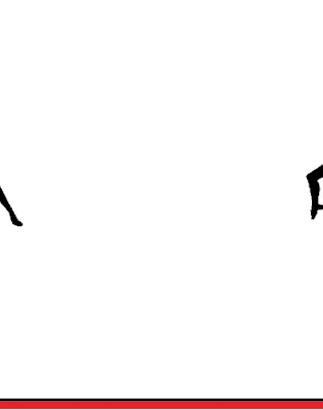

Jewish Star Torah columnists: Rabbi Benny Berlin, spiritual leader of BACH Jewish Center in Long Beach; Rabbi Avi Billet of Anshei Chesed, Boynton Beach, FL, mohel and Five Towns native; Rabbi Binny Freedman, rosh yeshiva of Orayta, Jerusalem; Dr. Alan A. Mazurek, former ZOA chair, retired neurologist, living in Great Neck, Jerusalem and Florida.
Contributing writers: Rabbi Sir Jonathan Sacks zt”l, former chief rabbi of United Hebrew Congregations of British Commonwealth; Rabbi Yossy Goldman, president South African Rabbinical Association; Rabbi Dr. Tzvi Hersh Weinreb, OU executive VP emeritus.
To submit commentary, inquire at: Editor@TheJewishStar.com. Contact our columnists at: Columnist@TheJewishStar.com.
Fri Nov 21 / 1 Kislev
Toldot
Five Towns candles: 4:15 • Havdalah: 5:23
Scarsdale candles: 4:14 • Havdalah: 5:16
Fri Nov 28 / 8 Kislev
Vayetzei
Five Towns candles: 4:11 • Havdalah: 5:20
Scarsdale candles: 4:10 • Havdalah: 5:14
Fri Dec 5 / 15 Kislev
Vayishlach
Five Towns candles: 4:09 • Havdalah: 5:18
Scarsdale candles: 4:08 • Havdalah: 5:13
Fri Dec 12 / 22 Kislev
Vayeshev • Shabbat Mevarchim
Five Towns candles: 4:10 • Havdalah: 5:19
Scarsdale candles: 4:09 • Havdalah: 5:13
Five Towns Candlelighting: From the White Shul, Far Rockaway, NY
Scarsdale Candlelighting: From the Young Israel of Scarsdale, Scarsdale, NY

Rebecca, hitherto infertile, became pregnant. Suffering acute pain, “she went to inquire of the L-rd” (vatelech lidrosh et Hashem). The explanation she received was that she was carrying twins who were contending in her womb. They were destined to do so long into the future:
Two nations are inside your womb; Two peoples are to part from you. One people will be stronger than the other, And the older will serve the younger (ve-rav ya’avod tsa’ir). Bereishit 25:23
Eventually the twins are born — first Esau, then (his hand grasping his brother’s heel) Jacob. Mindful of the prophecy, Rebecca favors the younger son, Jacob. Years later, she persuades him to cover himself in Esau’s clothes and take the blessing Isaac intended to give his elder son. One verse of that blessing was “May nations serve you; may nations bow down to you. Be lord over your brothers and may your mother’s sons bow down to you.” (Bereishit 27:29)
The prophecy is fulfilled — Isaac’s blessing can surely mean nothing less than what was disclosed to Rebecca before either child was born, namely that “the older will serve the younger.” The story apparently reached closure, or so, at this stage, it seems.
But biblical narrative is not what it seems. Two events follow which subvert all that we had been led to expect. The first happens when Esau arrives and discovers that Jacob has cheated him out of his blessing. Moved by his anguish, Isaac gives him a benediction, one of whose clauses is:
By your sword you will live, And your brother you will serve; But when you break loose, You will throw off his yoke from your neck. Bereishit 27:40
This is not what we had anticipated. The older will not serve the younger in perpetuity.
The second scene, many years later, occurs when the brothers meet after a long estrangement. Jacob is terrified of the encounter. He had fled from home years earlier because Esau had vowed to kill him. Only after a
The power of the future to transform our understanding of the past is the essence of Midrash.

long series of preparations and a lonely wrestling match at night is he able to face Esau with some composure.
He bows down to him seven times. Seven times he calls him “my lord.” Five times he refers to himself as “your servant.” The roles have been reversed. Esau does not become the servant of Jacob. Instead, Jacob speaks of himself as the servant of Esau. But this cannot be. The words heard by Rebecca when “she went to inquire of the L-rd” suggested precisely the opposite, that “the older will serve the younger.” We are faced with cognitive dissonance.
More precisely, we have here an example of one of the most remarkable of all the Torah’s narrative devices — the power of the future to transform our understanding of the past. This is the essence of Midrash. New situations retrospectively disclose new meanings in the text. The present is never fully determined by the present. Sometimes it is only later that we understand now.
This is the significance of the great revelation of G-d to Moses in Shemot 33:23, where G-d says that only His back may be seen — meaning that His Presence can be seen only when we look back at the past; it can never be known or predicted in advance. The indeterminacy of meaning at any given moment is what gives the biblical text its openness to ongoing interpretation.
We now see this was not an idea invented by the Sages. It already exists in the Torah itself. The words Rebecca heard — as will now become clear – seemed to mean one thing at the time. It later transpires that they meant something else.
The words ve-rav ya‘avod tsair seem simple: “The older will serve the younger.” Returning to them in the light of subsequent events, though, we discover that they are anything but clear. They contain multiple ambiguities.
The first (noted by Radak and R. Yosef ibn Kaspi) is that the word et, signalling the object of the verb, is missing. Normally in biblical Hebrew the subject precedes, and the object follows, the verb, but not always.
In Job 14:19 for example, the words avanim shachaku mayim mean “water wears away stones,” not “stones wear away water.” Thus the phrase might mean “the older shall serve the younger” but it might also mean “the younger shall serve the older”. To be sure, the latter would be poetic Hebrew rather than conventional prose style, but that is what this utterance is: a poem.
The second is that rav and tsa’ir are not opposites, a fact disguised by the English translation of rav as “older.” The opposite of tsa’ir (“younger”) is bechir (“older” or “firstborn”). Rav does not mean “older.” It means “great” or possibly “chief.” This linking together of two terms as if they were polar opposites, which they are not — the opposites would have been bechir/tsa’ir or rav/me’at — further destabilises the meaning. Who was the rav? The elder? The leader? The chief? The more numerous? The word might mean any of these things.
The third — not part of the text but of later tradition — is the musical notation. The normal way of notating these three words would be mercha-tipcha-sof passuk. This would support
the reading, “the older shall serve the younger.” In fact, however, they are notated tipcha-mercha-sof passuk — suggesting, “the older, shall the younger serve”; in other words, “the younger shall serve the older.”
Alater episode adds a yet another retrospective element of doubt. There is a second instance in Genesis of the birth of twins, to Tamar. The passage is clearly reminiscent of the story of Esau and Jacob: When the time came for her to give birth, there were twins in her womb. As she was in labor one child put out a hand, so the midwife took a crimson thread and tied it to his wrist, saying, “This one came out first.” But he pulled his hand back and then his brother came out. She said, “How you have burst through!” So he was named Peretz. Then his brother came out with the crimson thread on his wrist. He was named Zerah. (Bereishit 38:27-30) Who then was the elder? And what does this imply in the case of Esau and Jacob? These multiple ambiguities are not accidental but integral to the text. The subtlety is such, that we do not notice them at first. Only later, when the narrative does not turn out as expected, are we forced to go back and notice what at first we missed: that the words Rebecca heard may mean “the older will serve the younger” or “the younger will serve the older.” A number of things now become clear. The first is that this is a rare example in the Torah of an oracle as opposed to a prophecy (this is the probable meaning of the word chiddot in Bamidbar 12:8, speaking about Moses: “With him I speak mouth to mouth, openly and not in chiddot” — usually translated as “dark speeches” or “riddles”). Oracles — a familiar form of supernatural communication in the ancient world — were normally obscure and cryptic, unlike the normal form of Israelite prophecy. This may well be the technical meaning of the phrase “she went to inquire of the L-rd” which puzzled the medieval commentators.
The second — and this is fundamental to an understanding of Bereishit — is that the future is never as straightforward as we are led to believe. Abraham is promised many children but is 100 years old before Isaac is born. The patriarchs are promised a land but do not acquire it in their lifetimes.
The Jewish journey — though it has a destination — is long and has many digressions and setbacks. Will Jacob serve or be served? We do not know. Only after a long, enigmatic struggle, alone at night, does Jacob receive the name Israel meaning, “he who struggles with G-d and with men and prevails.”
The most important message of this text is both literary and theological. The future affects our understanding of the past. We are part of a story whose last chapter has not yet been written. That rests with us, as it rested with Jacob.

Veteran readers of this column are familiar with my paternal grandfather, Chaim Yitzchak Weinreb. He was an old-school Jew, with roots in the region of eastern Poland known as Galicia. He had studied under renowned Talmudists back in the old country, and his fervent wish was to see his grandchildren grow up to be dedicated Talmud students.
I was his oldest grandchild and discovered from a very early age just how determined he was to steer me in what he was convinced was the right direction. I particularly remember the time he visited my parents’ home when I was in the seventh or eighth grade.
I had just received my report card and proudly showed it to him. I felt it was a pretty good report card, but for him, anything less than perfection was inadequate. After one
glance, he noticed just how uneven my academic performance was.
He spoke to me in Yiddish, unadulterated by English phrases — pure, old-fashioned Yiddish. He protested that my grades were spotty. “You did very well in Chumash, but not nearly as good in Talmud. How can one truly know the Bible if he is ignorant of Talmud?”
I responded defensively by saying that I saw no connection between the Bible portions of Bereshit that we were then studying and the tractate of Bava Metzia, our Talmud text that year. “The Chumash is full of great stories, but the Talmud is only about legal arguments, some of which are over my head.”
He smiled and said that if I would give him an hour on the upcoming Friday night, he would give me kugel and soda, teach me a song, and demonstrate how the Talmud elucidates the Bible, in an “amazing” way. Only he didn’t say “amazing,” he said “vunderbar.”
That Friday, he personally served me the kugel and soda, taught me a song that he had learned from the old rabbi of his nowextinct shtetl, and asked me to review with him
a short passage in this week’s Torah portion, Toldot.
You know the story. Esau, the older brother, comes in from the field, famished. He finds his younger brother, Jacob, cooking a pot of stew and asks for some of it. Jacob is willing to give it to him, but for a price. He demands that Esau first sell him his birthright; that is, the material and spiritual privileges that come with being the first-born. Translated literally, he says: “Sell me your birthright, kayom, like today!”
He asked me if I found anything problematic with the story.
I did. “The phrase ‘kayom’ seems strange, Grandpa. Why does Jacob insist that the sale should be ‘like today’?”
He responded, “Good! Maybe you have a gemara kopp (a Talmudic intellect) after all! But
let’s see if you can ask a question on the whole transaction based on the Talmud texts you are now studying in school. Here’s your volume of Talmud. I’ll give you ten minutes to come up with a really good question.”
To say that I was frustrated would be putting it mildly. Not only was I going to be stuck studying all Friday night — I was actually being asked to think!
But one did not say no to Grandpa. So I opened the large book, pored over it and focused on the task with great concentration. I was searching for a connection between a fascinating story and what I then experienced as some very boring rules and regulations.
After some time, probably much more than the allotted ten minutes, I had an “aha” experience. I really got excited. “Grandpa! It can’t be! How could Jacob purchase the birthright from Esau? The privileges of the birthright are way off in the future. They include privileges like a dual portion of their inheritance of their father Isaac’s estate, and Isaac was alive, if not entirely well, at that time.

There is real pain for someone whose child goes on a path you did not intend for them.
A parent pours so many resources into Jewish education, values, and guidance, and yet the child seems uninterested. There is shame, there is embarrassment, there is the aching thought that my child is an expression of me, so how can it be that they chose such a different path.
In parshas Toldot, Esav chooses a radically different direction from Yitzchok and Rivka. We often describe the Avos by their defining Middos — Avraham is kindness, Yitzchok is strict justice, and Yaakov is balance. If anyone fits the image of demanding standards, it is Yitzchok. Yet Chazal reveal a side of Yitzchok that is both astonishing and desperately needed in our generation, especially for parents whose children have chosen lives different from their own.
The Gemara in Shabbos 89b describes what will happen before the final redemption. G-d will turn to Avraham and say, “These are your children who have sinned. What should be done?”
Avraham replies that they must be punished for the sake of G-d’s Name. Hashem asks Yaakov, who gives the same response. Finally, G-d turns to Yitzchok. And Yitzchok does something shocking. He does not condemn. He defends.
“Master of the world, are they only my children. Are they not Your children as well. When they accepted the Torah, did You not call them My firstborn son?”
Then Yitzchok makes a calculation that reveals the depth of a father’s love. A person lives 70 years. Remove the first 20 before full accountability. That leaves fifty. Half is spent asleep. Twenty-five remain. Half of those disappear into basic necessities like eating, leaving 12-1/2 years of possible sinning.
“If You can forgive those twelve and a half years, forgive them,” Yitzchok says. “If not, divide them with me. And if even that is too much, place the burden on me entirely. I was willing to give my life at the Akeidah. Put their

Ionce heard a story from a colleague in Johannesburg,who, like me, grew up in Brooklyn. He said that his grandfather was once the victim of an attempted mugging on Shabbat. Calmly, he told his attackers that it was his Sabbath and that he had no money for them.
“Come back on Sunday,” he said. They left him in peace. It seems a generation ago, even the muggers had some respect.
How times have changed. And with it, our values.
Today, Israel may boast the most successful and courageous defense force in the world; nevertheless, Jews at heart remain a peace-loving people. We fight for Israel because our lives depend on it, and we dare not let down our guard. But if we had a choice, we would much rather be doing other things with our lives.
I humbly submit that this peaceful, nonvio-
sins on my account.”
This is why, when redemption comes, the Jewish people will turn to Yitzchok and say, “You are our father.”
Why Yitzchok. What gave him the standing to speak like that.
The Derech Meir offers a breathtaking answer. The Torah says Yitzchok loved Esav because Tzayid B’Fiv, his trappings were in his mouth. I was taught growing up that this meant Esav fed his father game because he was a hunter and that generated love from Yitzchok.
But that understanding always bothered me. Could someone as holy as Yitzchok be charmed by a good steak? Or, as Rashi says, could Yitzchok be fooled by Esav asking whether we need to tithe salt and hay?
The Derech Meir says no. Tzayid B’Fiv does not mean that Esav trapped Yitzchok. It means
that Yitzchok was preparing an argument that he would one day say before the Ribbono Shel Olam, a trap, an argument in Yitzchok’s mouth. He loved Esav fully not because he failed to see who Esav was, but precisely because he knew. That heartbreak became the defense he would one day present for all of Klal Yisrael. If I continue to love my son when he strays, should You not continue to love Yours?
The Be’er Mayim Chaim illustrates this with a story. His son had abandoned Torah and Mitzvos. People whispered. The father’s heart broke daily. Yet he continued to love him, support him, and dress him in fine garments.
Every morning before davening he would say, “Master of the world, look how I treat my son who strayed. I am only flesh and blood. If I can love unconditionally, how much more should You love Your children even when they stray.” That is Tzayid B’Fiv.
So, what should a parent do when a child leaves the path? There is no single plan that fits every family, but one truth applies across the board: Love your child. Do not close the door. Ever.
lent nature is part and parcel of our Jewish DNA. It is genetic, inborn, innate. From where did we derive these characteristics? I believe that it is an inheritance and birthright transmitted down the generations from our earliest forebears. Our ancestors bequeathed us these qualities as part of our natural heredity, molded into our very genetic composition.
By nature, are we fighters or philosophers, trappers or thinkers? If we look at our Torah reading this week, Toldot, we read of the birth and early years of the twin sons of Isaac and Rebecca, two boys who could not have been more different. Jacob and Esau are the ultimate, classical unidentical twins.
As it says in the portion, “And the boys grew up, and Esau was a trapper (and deceiver), a man of the field (a hunter), while Jacob was honest and straightforward, a dweller in the tents (of Torah).”
Clearly, from the very beginning, Esau was a violent man who, according to commentary, not only hunted animals but also other people’s wives. Jacob was the opposite. He was a humble scholar with crime and violence the furthest things from his mind.
For generations, Jews have been blessing their children and grandchildren to emulate the ways of our patriarchs and matriarchs: Abraham, Isaac and Jacob, Sarah, Rebecca, Rachel and Leah, Ephraim and Menashe.
Can you even imagine a Jewish father blessing his child, “May you grow up to be like Esau?”
We don’t aspire to have children who are violent hunters.
My question today is whether this is still so, or are the societal values around us today affecting the mindsets of our younger generation?
In my own childhood, our mischievousness amounted to spraying the chazan with water when he finished reciting geshem, the annual prayer for rain. Or hiding the kohanims’ shoes when they went up to recite the priestly blessings in shul. In summer camp, we “raided” the kitchen when we were hungry at night. We
weren’t perfect, of course, but our misdemeanors were relatively minor.
And today?
Afew years ago, we experienced an act of deliberate vandalism by children in our synagogue, with red paint sprayed over the walls. Yes, kids will be kids, but such things were unheard of once upon a time. Who are our children’s heroes today? Who are their role models? The rabbis, scholars, intellectuals and Nobel Prize winners? Or are we living in a time when thugs are being elevated to the status of superheroes? Or when anyone worth valuing holds a weapon as opposed to a pen?
I cannot get my head around the fact that Luigi Mangione — who is facing the death penalty for allegedly murdering United Healthcare CEO Brian Thompson in Manhattan — is celebrated as a folk hero. Polls reveal that younger Americans are less inclined to view him negatively. To me, this is simply unbelievable!
Do our kids respect the “baddest, meanest and toughest?” Do they worship the Stallones, Schwarzeneggers and Stathams of the world?
Published weekly except during certain religious and civil holidays by The Jewish Star LLC New York City office: 5676 Riverdale Ave Suite 311, Bronx NY 10471 • LI office: 2 Endo Blvd, Garden City NY 11530 Here’s how to reach The Jewish Star — Write: Editor@TheJewishStar.com. Call: 516-622-7461 ext 291
Editor & Publisher: Ed Weintrob
516-622-7461 ext 291
Jewish Star Associate: Nechama Bluth
516-622-7461 ext 241
Content: The Publisher endeavors to ensure that our content is within the bounds of normative halachah and hashkafah. Anyone who feels anything we publish may be inappropriate in this regard is urged to bring the item in question to the attention of the Publisher. Advertising is accepted at the sole discretion of the Publisher and should conform to standards appropriate for distribution in an Orthodox community. Send us your news! Editor@TheJewishStar.com
Advertising: Publisher@TheJewishStar.com
Kashrut: The Jewish Star is not responsible for the
kashrut of any product or establishment featured in its pages. If you have questions regarding any establishment or product, including its supervision, please consult your rabbi for guidance.
Submissions: All submissions become the property of The Jewish Star and may be edited and used by the Publisher, its licensees and affiliates, in print, on the web and/or in any media that now exists or will exist in the future in any form, including derivative works, throughout the world in perpetuity, without additional authorization or compensation. The individual or entity submitting material affirms that it holds the copyright or otherwise has the right to authorize its use in accordance with The Jewish Star’s terms for submissions.
Opinions: Views expressed by columnists and other writers do not necessarily reflect the position of the Publisher or of The Jewish Star LLC.
Distribution: The Jewish Star is available free in kosher food establishments, stores, synagogues, and curb-side newsboxes on Long Island, in New York City and elsewhere. To request free delivery to your location, write Publisher@TheJewishStar.com.
Copyright: All content is copyright and may not be republished or otherwise reproduced without written permission by The Jewish Star; to do so without permission is against the law and halacha. For content reproduction write to Publisher@TheJewishStar.com.
The Jewish Star subscribes to JNS. It, or its contributors, own the copyrights on material attributed to them. The length and content of JNS material and all other submitted material may be edited by The Jewish Star.
Member: American Jewish Press Association.
This newspaper contains words of Torah. While it is not considered shaimos, please dispose properly.
Mitchell Bard, foreign policy analyst, authority on USIsreal relations; Ben Cohen, senior analyst, Foundation for Defense of Democracies; Stephen Flatow, president, Religious Zionists of America-Mizrachi and father of Alisa Flatow, murdered in an Iranian-sponsored Palestinian terrorist attack in 1995; Yisrael Medad, Americanborn Israeli journalist and political commentator; Rafael Medoff, founding director of David S. Wyman Institute for Holocaust Studies; Fiamma Nirenstein, Italian-Israeli journalist, author of 13 books, leading voice on Israeli affairs, Middle Eastern politics and antisemitism; Melanie Phillips, British journalist; Moshe Phillips, national chairman, Americans for a Safe Israel; Thane Rosenbaum, Distinguished University Professor at Touro University (published by Jewish Journal); Jonathan S. Tobin, editor-in-chief, Jewish News Syndicate.
S.

Nick Fuentes had good reason to celebrate. He is the leading example of the so-called “groypers” — the term applied to the particular brand of fanatical antisemites and far-right extremists for which he is the leading spokesperson. Any doubt that he was gaining ground in his efforts to be mainstreamed in American political discourse was removed on Sunday by President Donald Trump.
In one of his typical off-hand media availabilities, this time on his way back to the White House from a stay at his Mar-a-Lago resort in Florida, Trump was asked what he thought about former Fox News host Tucker Carlson giving Fuentes a friendly interview on his podcast. The president replied, “You can’t tell him who to interview.” Trump publicly dined with Fuentes in Mar-a-Lago along with Kanye West, another prominent Jew-hater, in 2022, and then afterwards claimed that he didn’t know who he was. He seemed to be repeating that story now by saying that he “didn’t know much about” Fuentes. Still, as far as he was concerned, if Carlson wanted to interview Fuentes, then “get the word out,” the president said. “People have to decide. Ultimately, people have to decide.”
While the claim of ignorance might have been credible three years ago, it doesn’t hold up anymore, especially after the debate among conservatives over Fuentes that has been raging in the last month.
While Trump and his supporters can claim that this doesn’t constitute an endorsement
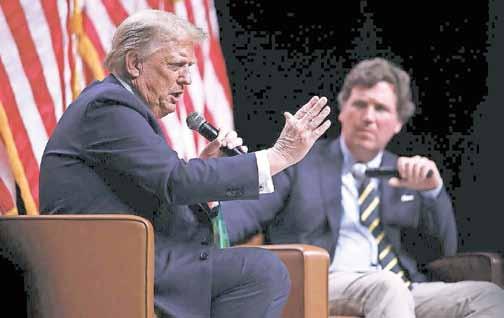
of the young antisemite, that wasn’t how the groyper leader — a figure with a large following on social media — treated it. He shared the video of the Trump statement with the comment, “Thank you, Mr. President.”
That’s a defeat for decent people, regardless of where they stand on the political spectrum, who would like to relegate extremist trolls like Fuentes to the fever swamps on the far right and out of mainstream discourse.
The Democratic Party has elevated its own brand of antisemites — far-left, progressive Israel-haters like New York mayor-elect Zohran Mamdani and the members of the congressional “Squad” — to be the rock stars of the political left.
The willingness of Trump and others to tolerate Carlson — and now, apparently, Fuentes — has created a crisis about antisemitism on the right.
Now the willingness of Trump and others to tolerate Carlson — and now, apparently, Fuentes — has created a crisis about antisemitism on the right.
This is shocking — and not just because one would have thought that no sensible person, regardless of political affiliation, would have thought a softball interview of Fuentes, in addition to other antisemites and Israel-haters Carlson has hosted on his show in the last year, would have been defensible.
But those who are voicing outrage about what Trump just said, as well as the other examples of those who rushed to Carlson’s defense, are missing something important. The argument isn’t so much about whether Fuentes’ hate is laudable. It’s about “gatekeeping.”
The notion that some views, like Fuentes’ particular variant of neo-Nazi lunacy, are so abhorrent that they ought not to be considered worthy of discussion, let alone a fair hearing, has become completely discredited among
many conservatives.
A not-insignificant portion of political thinkers and voices on the right seems to have adopted the position that shutting down discussion of any opinion — no matter how disgusting or immoral — is wrong. And many people who may not be comfortable with extremists in any other context are nodding along with the defense of Carlson because of this.
How did we get here?
The answer is that it is an overreaction to the way the political left and its toxic ideologies about race have come to dominate the public square in recent years, with the entire tenor of the national debate deeply influenced by the intolerance of the left.
Sadly, in confirmation of the horseshoe theory of politics in which extremists always find common ground in their shared antisemitism, some on the right, like Carlson (and the even more odious far-right political commentator Candace Owens and Fuentes), are playing the same game. The only difference is that rather than claiming that Israel is a racist state because it’s Jewish, they seek to delegitimize Christian Zionists and Jews by upholding old traditions of Christian theological antisemitism and isolationist tropes about Jews being aliens who threaten and manipulate American interests for the sake of Israel.
In a saner era, conservative thought leaders would not put up with such appalling views being treated as debatable, let alone something decent people should tolerate. That is exactly what William F. Buckley, the founder of modern conservatism, did in the 1960s to the extremists of the John Birch Society, and again, in the 1990s, to antisemites like Pat Buchanan and Joseph Sobran.
Buckley’s “gatekeeping” was long celebrated by conservatives as evidence not only of his leadership but of how the political right was able to discard crackpots and achieve enormous political victories.
That kind of gatekeeping isn’t merely out of fashion on the right, it is currently viewed

New York Sen. Chuck Schumer loves to call himself Shomer Yisrael, the “Guardian of Israel.” But Schumer isn’t the guardian of Israel — he’s the abandoner of his people. And now the very party he sold them out for is turning on him.
I know this story personally. My father helped launch Schumer’s political career, from Brooklyn councilman to congressman to senator. He believed in him. He believed that a proud Jew in public office would stand up for his community and for Israel when it mattered most. He was wrong.
When my father ran for City Council in 2001, Schumer betrayed him, endorsing his own former staffer instead. That was the first lesson I learned about Schumer: Loyalty for him is purely transactional. I refused to shake his hand years later at the Democratic National Conven-
History is filled with Jews who convinced themselves that silence was safety, that blending in would spare them.
tion in North Carolina, and I have no regrets.
Two decades later, America is watching the same pattern repeat itself, this time on a national stage.
Democrats reportedly erupted after a deal to end the historic government shutdown cleared a Senate hurdle. Schumer’s own caucus accused him of selling them out, demanding his resignation and calling the agreement “a surrender.”
Progressive Democrats wanted a fight; Schumer gave them a handshake. The man who prides himself on keeping his finger on the political pulse suddenly can’t stop the bleeding inside his own party.
This is poetic justice. Schumer has spent years appeasing the far left — the same activists and politicians who slander Israel, excuse Hamas and normalize antisemitism in America’s streets and classrooms. He thought that by bending to them, he could keep his power. Instead, they’ve decided he’s the next one to break.
He should have known better. History is filled with “Schumers,” Jews in pre-war Europe who convinced themselves that silence was safety, that blending in would spare them. But cowardice has never protected anyone. You can’t negotiate with hatred; you can only confront it.
When antisemitism exploded after Oct. 7, Schumer had every platform, every microphone and every ounce of influence needed to lead. Instead, he hid behind balance and caution. He watched his party’s radicals chant “from the river to the sea,” and he said nothing. He watched Jewish students being harassed on American campuses and offered only a vague tweet about tolerance.
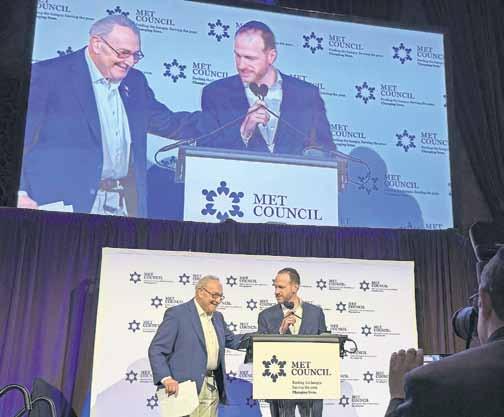
GLOBAL FOCUS BEN COHEN

Now that Zohran Mamdani has been elected mayor, should Israeli Prime Minister Benjamin Netanyahu test the 34-year-old’s pledge to arrest him by visiting New York?
Inna Vernikov, a Ukraine-born Jewish Republican councilwoman from Brooklyn, clearly thinks that he should.
Last week, Vernikov — an outspoken supporter of the Jewish state and one of the most visible opponents of the pro-Hamas demonstrations that have blighted this city — issued an invitation to Netanyahu to visit on Jan. 1, the day Mamdani takes office. “In recent months, there have been irresponsible and frankly absurd statements made by Mayor-elect Zohran Mamdani, who has campaigned on the promise of ‘arresting’ you upon setting foot in our city,” she wrote. “Your visit would stand as a powerful reminder that this city stands with Israel, the Jewish people, and the principles that unite our two great nations.”
Vernikov, of course, is confident that no arrest would take place should Netanyahu come here.
There is an arrest warrant for the Israeli leader, along with former Defense Minister Yoav Gallant, which was issued last November by the International Criminal Court in The Hague, al-
Mamdani won’t arrest Netanyahu. If he admits that, his supporters would view him as a sell-out.

leging both war crimes and crimes against humanity — though notably, in this context, not for “genocide,” the word constantly screeched in Netanyahu’s direction by Mamdani and his acolytes. But as anyone with a modicum of awareness of the US relationship with the ICC would have known before speaking out, the warrant simply isn’t valid in the Big Apple or anywhere else in this country.
Not only has the United States, under successive Democratic and Republican administrations, refused to ratify the Rome Statute underpinning the ICC’s efforts.
In February of this year, President Donald Trump imposed sanctions on the court, pointing out that it has, “without a legitimate basis, asserted jurisdiction over and opened preliminary investigations concerning personnel of the United States and certain of its allies, including Israel, and has further abused its power by issuing baseless arrest warrants targeting Israeli Prime Minister Benjamin Netanyahu and Former Minister of Defense Yoav Gallant.
The ICC has no jurisdiction over the United States or Israel, as neither country is party to
the Rome Statute or a member of the ICC.”
You can’t really get more black and white than that.
Were the Israeli premier to roll up in any of the five boroughs, it’s far more likely that in attempting to execute the ICC’s warrant, it would be Mamdani, and not Netanyahu, who would find himself on the wrong side of the law.
Though Vernikov hasn’t said as much, clearly, her purpose is to embarrass Mamdani by showing the avowedly socialist mayor the limits of his powers. Like his plans for free buses, which would promptly become magnets for petty criminals, or municipally owned grocery stores, which would put hundreds of immigrant-run bodegas out of business, the promise to arrest Netanyahu is built on sand.
Were he to visit, the likelihood is that the prime minister would be trolled around Manhattan by keffiyeh-clad supporters of the Hamas death cult before safely departing again for Tel Aviv. For his part, Trump openly regards Mamdani’s threat as performative nonsense, jovially telling Netanyahu during their White House
meeting in July that should he find himself behind bars during a trip to Gotham, “I’ll get you out.”
Mamdani, it appears, has yet to receive the message. In a recent conversation with proHamas influencer Mehdi Hasan, he denounced Netanyahu as “someone who is facing a warrant from the ICC, someone who has perpetrated a genocide of Palestinians for close to two years,” earnestly opining that New York City under his stewardship could “showcase a model of what politics could be — that we are a city that believes in international law.”
As is well known, Mamdani has never had an actual job, let alone any experience of running one of the world’s largest and greatest cities. But we shouldn’t make the mistake of assuming that he is a dimwit because of that. Deep down, he knows that his proposal to arrest Netanyahu is a non-starter, but he cannot admit as much, as his supporters — many of whom are irredeemably dimwitted — would regard this as a sell-out.
The mischievously delightful chutzpah undergirding Vernikov’s invitation to Netanyahu is based on this realization. On literally day one of his four-year term in office, Mamdani would be forced to watch one of his signal campaign promises melt into the air.
Netanyahu himself understands this, having acknowledged during his last meeting with Trump that Mamdani’s goal is “silly” and “not serious.” So, should he respond to Vernikov in the affirmative?
There is certainly great value in frustrating Mamdani at the earliest possible opportunity. Doing so would expose that the support for Hamas he and his supporters have indulged in, while often violent and always ugly, is essentially theatrics. No one seriously believes that Mamdani will obtain a prized photograph of a chastened Netanyahu being dragged out of the Waldorf Astoria by officers of the New York City

Ialmost felt sorry for Peter Beinart. Almost. But then I took hold of myself, reviewed his history and enjoyed a wry chuckle.
In 2012, Mark Levine, a professor at the University of California, Irvine, published a piece in Al Jazeera criticizing the journalist, which began, “Poor Peter Beinart. For the past two years, he has served selflessly on the front lines of a fight for the “soul of Zionism,” attempting to preserve — or better, revive — its supposedly liberal patrimony.”
He noted Beinart’s 2010 opinion essay in the New York Review of Books in which he argued that “by refusing to criticize the never-ending occupation and support for a more liberal strand of Zionism, the organized Jewish community was in danger of losing the support of the emerging generation of Jews.” The policies of Israel’s government were perceived to “contradict their largely liberal sensibilities.”
A dozen years later, in March 2024, Beinart, still championing liberalism, wrote in the New York Times: “The emerging rupture between American liberalism and American Zionism constitutes the greatest transformation in American
Beinart has continued to adopt more extreme positions.
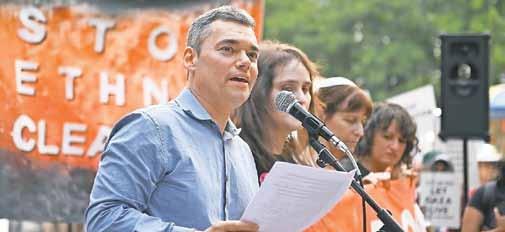
Jewish politics in half a century.”
By that time, he was four years into his rejection of the idea of a Jewish state, preferring, as he wrote again in the Times, that a Jewish state not be “the dominant form of Zionism.” He insisted that a Jewish state “is not the essence of Zionism. The essence of Zionism is a Jewish home in the land of Israel, a thriving Jewish society.”
In the past three years or so, Beinart has adopted more and more extreme positions. Yet as we know, once one enters that arena, the competition to stand out simply causes one to become even more extreme.
On Nov. 16, under the sponsorship of Jewish Currents, where Beinart is editor-at-large at the magazine, he was in conversation with Palestinian (actually, Syrian) Columbia University graduate and pro-Hamas activist Mahmoud Khalil, the target of an attempt to deport him. Beinart is far gone.
But last week, “Within Our Lifetime/Palestine” activist Nerdeen Kiswani came upon the scene. The following excerpts from their exchanges may be a tad complex, but stay with me. But first, some background.
Let us recall her core belief: “For those that are new here, saying “Israel has a right to exist, just not as a Jewish state” isn’t anti-Zionism, it’s liberal Zionism. The question isn’t what kind of Israel, it’s how Israel came to exist, which is through genocide. Anti-Zionism necessitates decolonization.” Zionism cannot be cleansed, cannot be permitted into the family of nations, cannot be defended. Zionism must be eliminated and the Zionist state must be erased.
Kiswani tweeted, in reaction to New York state assemblyman Zohran Mamdani’s condemnation of the swastika daubings in Brooklyn the day after the city’s mayoral election, where Socialist Democrat came out the winner:
There’s no “scourge of antisemitism” in New York City. “Acts like these, while reprehensible, are often weaponized to justify Zionist narratives and repression of Palestine solidarity. Many past ‘antisemitic’ scares turned out to be fake.” … Norman Finkelstein has spoken about how antisemitism in the United States is largely a political tool, not a real social phenomenon. Mamdani shouldn’t be validating this framing.
Beinart, upset, responded:
Your response to a swastika at a yeshivah is to condemn the mayor for condemning it? Because that might imply that antisemitism is a “real social phenomenon?” Yes, like other bigotries, it’s a “real social phenomenon.”
Unfazed and unrepentant, Kiswani tweeted back:
Antisemitism is not a systemic structural issue in the US. Everyone knows this except for professional victims. There is a nazi problem in the US, and sadly, many of these Nazis are Jewish people. In fact, many Jewish people proudly proclaim that 95% of Jews are Nazis (zionists), which even I said was a bit much. If you want to truly fight against the nazi problem, I suggest you start with your own community.
She then continued in a direct social-media platform assault on Beinart: You really have some nerve, grifting and writing books about “after” the genocide of my people, as it’s still ongoing, to completely reframe what I was saying. I never condemned his condemnation of the graffiti; I explicitly called it reprehensible myself. I took issue with the implication that there’s an antisemitism problem in NYC. … [T] here’s no structural disadvantage to being Jewish like there is to being Palestinian, and you know that. You’re being purposely obtuse. You can pander to the antigenocide line, but you’re still a liberal zionist.
1 on page 22

Far too many pro-Israel organizations and writers marked the 50th anniversary of the UN General Assembly vote to adopt Resolution 3379 — which stated that Zionism “is a form of racism and racial discrimination” — by showcasing the efforts that the late Daniel Patrick Moynihan, the US ambassador to the United Nations when the resolution was passed, made to work against it.
While Moynihan was right in saying that “it is a lie which the United Nations has now declared to be a truth — and so the actual truth must be restated,” the United Nations still is an extremely anti-Israel institution.
Resolution 3379 was rescinded in 1991, but that’s not as important as recalling all of the times the international body was wrong for targeting Israel when Israel took action in selfdefense. And that’s because the United Nations is a deeply flawed organization that continues to single out Israel for responding to terrorism and other threats it faces.
A quick review of the history of just a few of the very many times that Israel was criticized by the United Nations for its actions because it supposedly violated “international law” is instructive here. But first should come a reminder that
The UN sides with Jerusalem’s enemies again and again.
“international law” is not something that really exists. And even if it did exist, there are times any country would be correct to ignore it, especially countries that reside in singularly rougher regions in the Middle East.
•After the Mossad’s capture of Adolf Eichmann in Argentina, the UN Security Council passed Resolution 138 on June 23, 1960, complaining it was a “violation of the sovereignty of a member state.”
Some 20 years later, Israel’s Prime Minister Menachem Begin initiated significant action three additional times that are well worth noting.
•On July 30, 1980, the Knesset ratified the “Basic Law: Jerusalem, Capital of Israel” that, among other things, applied sovereignty to the city, including the Old City, even though the law, rightly, did not use the terms sovereignty or annexation. UN Security Council Resolution 478 attacked Israel for the move.
•On June 7, 1981, an Israeli Air Force raid carried out on June 7, 1981, destroyed the Osirak nuclear reactor under construction in Iraq. The United Nations adopted Security Council Resolution 487, harshly criticizing Israel for the operation.
•On Dec. 14, 1981, Israel’s Knesset passed the Golan Heights Law, through which Israeli law was applied to the Golan Heights. The UN Security Council Resolution 497 called the Israeli action “null and void and without international legal effect.” In March 2019, Washington officially stated that it recognized Israeli sovereignty over the Golan.
The threat of resolutions did not stop Begin from doing what was in Israel’s best interest and was needed to protect its very existence.
Can one imagine what the Gulf War would have looked like for Israel and the United States had Saddam Hussein possessed nuclear-armed SCUD missiles, or what the Syrian

Civil War would have meant for Israel if Assad controlled the Golan Heights?
In the end, what did the UN Security Council resolution really mean for Israel? Was there any tangible impact? Any lasting impact at all?
It is worth noting that Begin was not alone in the 1980s in seeing his actions criticized by the world body. President Ronald Reagan’s 1986 order to bomb Libya and 1983 order to invade Grenada were also condemned by the United Nations and called illegal.
But Begin was not alone. Former Prime Minister Yitzhak Rabin and Defense Minister Shimon Peres gave the go-ahead for the 1976 Entebbe rescue mission.
•In the aftermath of the Entebbe operation, then-UN Secretary-General Kurt Waldheim described the raid as “a serious violation of the national sovereignty of (Uganda), a United Nations
member state.” The United Nations should have praised the Israeli victory against the terrorist hijackers, but failed to do so.
The world body sides with Israel’s enemies again and again, no matter what the issue. And that is the simple truth as we have seen again and again since the Hamas-led terrorist invasion of southern Israel on Oct. 7, 2023.
We cannot hold our breath and wait for the United Nations to ever praise Israel or approve of its actions.
What we can do is remind Israel’s leaders — and ourselves — that instead of hesitating, we should look to the examples mentioned above and gain the confidence necessary to do the necessary things. History has taught us this. It has also taught us that the State of Israel is not hurt by UN criticism and threats.
Write: Columnist@TheJewishStar.com

Visiting the Collingwood art and street fair in September, my wife and I did not expect to find anti-Israel slogans stenciled into the sidewalks and an anti-Israel Defense Forces message chalked in front of the CWOOD sign in front of City Hall.
It felt unnerving and out of place that the pitch of standard slogans rallying against Israel would be underfoot on this sunny day in downtown Collingwood, which calls itself “a progressive community” in Ontario, Canada, with not one person seeming to be bothered enough to question the message’s offensiveness.
I made my concerns clear to the town organizers, where I met Tim Fryer, the deputy mayor, by chance, and expressed my concerns. I felt unsafe and threatened by these messages that had no place on the city’s walkways. I asked that they be removed. The response I got is what prompts me to write this article.
“These messages are an expression of free speech,” was one city official’s response, to which I countered, in an effort to educate, “No, these messages are an incitement to hatred, a subversive attack on the Jewish people.”
The social contract has been broken.

Ihave since written to the town, now three times, without response. I requested to address the City Council to explain the difference between free speech and the vicious propaganda designed to normalize and demonize the Jew. The playbook was written less than a century ago in 1930s Germany. The free-speech answer to the passive response to these messages of hate is complicit in societal moral indifference.
The ultimate objective of this relentless campaign of slogans and rallies by unknown organizers is to normalize and demonize the Jewish person to create a moral indifference in society.
This is the subversiveness of contemporary antisemitism, which could very well rally an incitement to violence against Jews. There is sufficient expert testimony and counter-information in the public domain.
The answer “I didn’t know” in the aftermath of violence will not cut it. The inaction of governments and the continued propagation of media supporting misinformation on the war in Gaza make all people who have turned a blind eye participants in this relentless campaign of antisemitic intentions.
The methodology is not new; it is merely modernized. The success of the “Final Solution,”
is no excuse
as 6,000,000 Jews were corralled into cattle cars and murdered in concentration camps, should dumbfound anyone. This genocide happened without a widespread moral uprising from the German populace, which would have taken place in the midst of Nazi propaganda and the systematic marginalization of Jews.
The success of these campaigns rests on manufactured ignorance. During a casual conversation with a young man at a downtown Toronto event, I was told in earnest that the people who currently occupy Israel are not the original Jews, but rather people from Europe who took over Palestine due to a lack of space. He then doubled down, “It’s easy to see that because people in Israel have blond hair and blue eyes.” It struck me at the sincerity of his commitment to these audacious claims — a truth he had come to believe in. I told him to visit Israel.
Manufactured beliefs are amplified by political failure. On my morning walks through the University of Toronto campus this summer, I was confronted daily with spray-painted declarations of hate for the Jews; “F**k Israel” tends to be the message of choice. I will admit to a feeling of being targeted and demoralized by the constant messaging. I guess that’s the objective: the normalization of Jewish hate.
The violent consequence was clear at a recent Toronto Metropolitan University (TMU) event by Students Supporting Israel (SSI), when masked persons forcibly entered a private event featuring IDF veteran, Jonathan Karten. The activists broke through a glass door and caused injuries to the speaker.
The student attendees were terrified, and if not for Karten’s quick thinking, things could
Ellis on page 23

Astrange thing happened in the middle of the night on Monday: the United Nations Security Council approved one of the most acrobatic, contradictory resolutions in its long history.
It envisions an International Stabilization Force marching into Gaza to rebuild “civil order,” control the borders, dismantle Hamas’s military infrastructure and — almost as an afterthought — lay down “a path toward a Palestinian state.”
As always, the conditions are buried in diplomatic language. First, Hamas must complete the handover of the hostages — alive or dead. Only then, we are told, can the plan proceed to “phase two,” as President Donald Trump has often described and as Israel has always insisted. Without Hamas’s disarmament, however, the entire resolution becomes a dead letter. Everyone knows it.
Still, if the plan begins, Egypt and Israel will be the primary interlocutors, while the US — more realistic than the UN — will remain the long-term guarantor. Israel would withdraw gradually as various international forces deploy.
It all sounds orderly on paper; on the ground, everyone understands the real obstacle is the same as it has been for decades: Hamas, its deceit — and the international community’s refusal to recognize the evil nature of the enemy. The resolution’s most controversial line sketches “a path toward a Palestinian state,” and here the geopolitical theater shifts from New York to Washington. Saudi Crown Prince
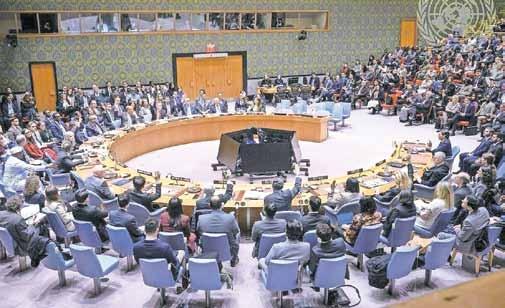
Mohammed bin Salman arrives for his first visit since the Khashoggi affair froze relations with former US President Joe Biden.
The Saudis today are the central pillar of Trump’s regional vision: a new axis balancing Israel, Qatar and Turkey, creating a Middle East no longer held hostage by Iranian tyranny or Muslim Brotherhood expansionism. Saudi normalization would grant bin Salman what he prizes most: American and Israeli protection from the Shiite advance and from the Sunni radicalism propelled by Ankara and Doha. These forces worked overtime before Oct. 7, 2023, to prevent precisely such an alignment. And Iran, sensing danger, has since reactivated every proxy. Hezbollah, bruised by Israel, has snapped awake.
Weapons now pour into Judea and Samaria,
Iraq and Yemen. Iran is emptying its arsenals, scraping the barrel. Even the weakened Hamas is preparing weapons depots in East Africa, waiting for the opportune moment to strike.
Trump knows the price for Saudi partnership: F-35s for bin Salman, and a promise that the United States will resume talking about a Palestinian state. Behind these transactional details stands a larger promise: that Israel, strengthened by its wartime victories, will anchor the region’s security architecture.
It is unsurprising, then, that Israeli Prime Minister Benjamin Netanyahu — pressed by critics on both right and left — reaffirmed that Israel’s opposition to a Palestinian state “has not changed at all.” He also made clear that Israel is ready to act if Hamas rejects the Trump plan.
A UN plan for Gaza collides with hard regional realities.
Chief of Staff Lt. Gen. Eyal Zamir has already confirmed Israel’s military readiness. Meanwhile, Hamas spokesman Hazem Qassem declared that the terror group will hand over weapons only to the Palestinian Authority — a statement meant to sound responsible but, in reality, it is little more than a joke.
The UN document claims that as Gaza is stabilized and the PA undergoes reforms, “conditions may finally emerge for a credible path to self-determination and a Palestinian state.” The phrasing borders on fantasy. Yet it follows the logic of the Abraham Accords: build alliances, isolate extremists, reward responsible actors.
For Israel, the strategic imperative is clear. Keep Erdogan and Qatar out. Bring Saudi Arabia in. Maintain the iron bond with the United States, which remains the indispensable guarantor of regional order.
As for the F-35s for Riyadh: yes, they are formidable weapons, and in the wrong hands they could prove dangerous. But Israel operates them on an entirely different, self-engineered technological platform — giving Jerusalem a decisive edge. The real issue is not hardware but strategy: ensuring that Israel remains strong, allied with Washington and positioned at the heart of a new, more stable Middle East. This is the moment to protect Israel’s hardwon victories, secure its alliances and prevent the region from sliding back into illusions. The UN may speak the language of dreams, but Israel must continue to act with the sobriety that reality demands.
Write: Columnist@TheJewishStar.com
Continued from page 18
as wrong and somehow no different from the cancellations meted out to dissenters from the woke catechism of diversity, equity and inclusion (DEI) or the idea that America is an irredeemably racist nation by BLM and other progressives.
In its place is the sort of nonjudgmental attitude about extremism voiced by popular podcasters like Megyn Kelly, Matt Walsh, and now, the US president himself.
But just because leftists were wrong to accuse Trump of being a racist, a Nazi, or — in an act of unconscious irony because he is the most pro-Israel president in history — an antisemite, and to do the same to others on the right doesn’t mean that there are no such things as racists, Nazis and antisemites.
Carlson’s decision not merely to platform but give the views of the repellent racist and Jewhater a sympathetic and even supportive hearing has divided conservatives in recent weeks. More than that, he used the show to vent his own hatred for Israel, “Christian Zionists” — whom he denounced as guilty of “heresy” and suffering from a “brain virus” — and to float the traditional antisemitic trope about Jews being guilty of dual loyalty.
Most mainstream conservatives and Republicans treated this latest example of Carlson’s soft
spot for Jew-hatred as conclusive proof that the podcaster and longtime member of the Trump family inner circle should be condemned as a hate-monger, rather than be treated as a star of the political right.
Others, such as Heritage Foundation president Kevin Roberts, as well as other right-wing podcasters like Kelly and Walsh, defended Carlson and condemned those calling him out.
Roberts’ continued willingness to treat Carlson as a friend, rather than someone to be censured and isolated, has led to an exodus of staffers, scholars and donors from Heritage, and some of its task forces. They believe that an institution that had become a leading voice of opposition to the growing threat of left-wing Jew-hatred is fatally compromised by its ties to someone who is obsessed with disgust for Israel and the Jews.
Part of this is just another manifestation of the surge of antisemitism that was unleashed by the Hamas-led Palestinian Arab attack on Israel on Oct. 7, 2023, and event that demonstrated how the violent victimization of Jews seems to unleash the virus of hate against them that continues to plague civilization.
That it exists on the right as well as the left is
tragic. It’s an objective that can only be achieved via the genocide of approximately half of the Jews in the world who live in Israel, and almost always involves the use of tropes, language and actions that are inherently and unabashedly antisemitic. At the same time, significant numbers on the right — though nothing close to the consensus on the left — have come to a similar conclusion, even though they arrive at it via a different ideological path.
The allergy that conservatives have developed to the idea that lunatics should not be tolerated is a problem that must be addressed. Trump’s acquiescence to this idea and Vice President JD Vance’s silence about the actions of Carlson, who is his personal friend and someone to whom he owes a political debt, is more than troubling.
The cancellations of the left and their intolerance for free speech remain a major concern. That they treat their efforts to suppress the speech of others as a form of free speech that must be protected — their main argument against Trump’s efforts to defund schools that tolerate and encourage antisemitism — is nothing less than gaslighting.
However, if the right’s reaction to this lamentable state of affairs is to declare that nothing is out of bounds and that everything, including
the unabashed racism and hatred of Fuentes, is something about which decent people must agree to disagree, then that is just as bad. It also contradicts normative conservative political philosophy from its origins in the writings of English statesman Edmund Burke to Buckley to those who are now seeking to defend the right from Carlson and Fuentes.
Such ideas attack the basic notions that liberty is best defended by the preservation of traditions and norms that stem from the founding principles of Western civilization, and the legacy of Jerusalem, Athens and Rome.
The left’s war on the West isn’t purely one about silencing opposing views. It’s an assault on the beliefs that are the foundation of our civilization.
The West cannot be defended by platforming and normalizing neo-Nazis and antisemites; that’s exactly how the left is seeking to destroy it. Being judgmental about hate isn’t weak or surrendering to political opponents.
It’s time for conservatives, including those who are still traumatized by the intolerance of the left, to realize that defending their movement against hatemongers is just as important as fighting against the insidious Marxist ideas of the left.
Write: Columnist@TheJewishStar.com
Continued from page 17 Continued from page 17 Continued from page 19
We studied in the Talmud that one cannot buy or sell objects or privileges which do not yet exist!”
My grandfather was thrilled, but no more than I was. Finally, I saw a connection between my Bible stories and the legal terminology of the Talmud that I had begun to resent. He then sat back, asked me to relax, and took the role of the teacher.
“If you reached page 16 of the tractate you are studying, you know this scenario. A fisherman wishes to sell the fish he will catch that today to a customer. He doesn’t have the fish yet. Can he sell them? Yes, answers the Talmud. He can sell them if he desperately needs the money to feed himself that day. If one is desperate, he can sell even objects that he does not yet possess, even fish that are still in the sea.”
There is a logical rationale for this legal principle, which I will omit from this column in the interest of brevity. Suffice it to say that I now saw the connection between the story and the Talmudic principle:
“Of course Jacob said kayom. Sell me your birthright even though its privileges will not be realized until the distant future, but do so in your current state of desperation. Do so because you are famished, and in your desperation have the legal ability, much like the fisherman, to sell something which is now non-existent, because you need it for your urgent immediate needs. Sell me the birthright kayom.”
Grandpa was proud of me that day, but I was even prouder of myself. He told me that the concept that I had discovered on my own was to be found in the commentary Ohr HaChaim, which he studied assiduously every Friday night.
He then leaned back, stared at me with his gentle blue eyes and said, “I am trying to think of a prize, a reward for your willingness to sit with me for a few hours on a Friday night, for exerting your young intellect, and for seeing the connection between the Written Torah, Scripture, and Oral Torah, Talmud.”
I sat there imagining all sorts of possible rewards, certain that he would ask for my input. Kugel and soda would have been acceptable, but lowest on my list of suggestions. I was thinking big bucks, or at least tickets to a baseball game.
Then he told me his idea. “From now on, every time I visit you, we will study together. And we will make it our business to discover connections. Our motto will be the verse in Psalms that says that G-d’s Torah is perfect, soothes the soul and brings joy to the heart.”
What a disappointment for a 12-year-old. But today, many decades later, each time I sit down before a folio of Talmud, I experience Grandpa’s reward. I can now appreciate Grandpa’s willingness to risk his popularity with his grandchild, instead using every means at his disposal to get us to sit and learn with him.
Write: Columnist@TheJewishStar.com
You never know when a child will decide to come home. It may not happen in your lifetime. Maybe when they have children of their own. Maybe generations later.
The Gemara in Kiddushin 36a discusses an argument regarding being G-d’s children.
One opinion says we are called children only when we do His will. Rabbi Meir says we are children unconditionally. Banim Atem LaHashem Elokeichem. Bein Kach U’Bein Kach Atem Keruyim Banim. Whether we behave properly or not, we are still G-d’s children.
Where did Rabbi Meir come from? He was a descendant of Roman converts from the line of Esav! Did Esav ever return. No. So was Yitzchok’s love wasted. It did not bring Esav back. But it allowed Rabbi Meir to be born. From the son who strayed came the Tanna who taught that we are always G-d’s children.
A parent may feel disappointment, embarrassment, fear for younger siblings, and deep pain. Unconditional love does not mean unconditional approval. Boundaries and values still matter. But a child must know without a doubt that your love is always unwavering.
If Yitzchok could stand before G-d and say, “Place their sins on me rather than give up on them,” then surely, we can stand before our own children and say, I may not agree with your choices, but nothing will ever make me stop loving you.
Bein Kach U’Bein Kach Harei Zeh Banim. Whether this way or that way, they are still our children.
Write: Columnist@TheJewishStar.com
Have our favorite films become those titled “Rambo,” “The Terminator” and “The Beekeeper”?
I’m not confident that a pair of muggers would respect Shabbat these days. But I pray that our own children do.
Let’s make sure the younger set’s role models are the Jacobs of Jewish history and not the Esaus of the world. And may we proudly continue nurturing the higher values embodied in our Jewish birthright and our noble and honorable national character.
Write: Columnist@TheJewishStar.com
brand of appeasement. They don’t want a guardian; they want a martyr.
Here’s the tragic part: When they come for me, Schumer, they’ll come for you, too. You thought you could buy time by pretending loyalty to them, by selling out your own people to prove you’re one of the “good ones.” But the mob doesn’t care. They never do.
The same ideological poison spreading through the far left, antisemitism masked as social justice, doesn’t stop at Israel’s border or the synagogue door. You can shout “equity” and “human rights” all you want; they still see a Jew.
Schumer could have been a giant. He could have been the Jewish statesman who led with courage in a moment of moral chaos. Instead, he chose to be a poll-tested politician, a man so afraid of losing his base that he lost his soul.
He didn’t stand with his people when the lies started. He didn’t lead when the hate mobs took over. And he didn’t protect his country when it needed moral clarity over partisan survival.
The irony is bitter; the man who called himself the Guardian of Israel now needs guarding from his own party.
Schumer chose party over principle, and party over his people.
Now, his party has chosen to devour him.
Cohn is founder of Rocketship PR and media adviser to the American Middle East Press Association. Write: Columnist@TheJewishStar.com
Police Department, handcuffed in his pajamas. Mamdani’s failure here would therefore be a much-deserved poke in the eye to the keffiyeh cult, a morale boost for the significant majority of Jewish citizens of New York who voted against him and a reminder of the vital role that Israel plays in the city’s economy. According to the latest study by the United States‒Israel Business Alliance, Israeli companies have generated the city nearly $20 billion of revenue and created 25,000 jobs.
But Netanyahu must also weigh up the negatives, like his personal unpopularity among many Israelis as well as American Jews. There is a risk that accepting Vernikov’s invitation will center the dispute with Mamdani around Netanyahu personally, instead of the incoming mayor’s rancid objection to the existence of Israel as a Jewish, democratic state and his support for boycotting the very same companies that have brought so much wealth to New York.
He must also ask whether, as Israel’s prime minister, it is appropriate for him to go head-tohead with the mayor of a foreign city. For these reasons, there will likely be those in Netanyahu’s circle advising him to keep his powder dry by saving his next visit for a more important occasion, such as the annual UN General Assembly in September.
Whatever Netanyahu decides, we should take heart from Vernikov’s initiative. Mamdani will not govern this city unopposed. Every misstep and every non-viable campaign promise will come back to bite him in the rear. The next four years will be a battle, and it has already started.
Write: Columnist@TheJewishStar.com
from page 20
The last line is the bonus: For hardcore antiZionist, pro-Palestinian Kiswani, “liberal Zionism” is a curse, an evil. She then added:
For those who are new here, especially the self-proclaimed anti- or ‘non-Zionists’ (whatever that’s supposed to mean), antisemitism is not a structural issue in the United States. Jews are positioned as white in America, holding access to pow-
Continued from page 21
have been much worse. The attackers’ rhetoric of calling attendees “war criminals” provided the perceived moral license to move from rhetoric to physical assault. This is the tragic endpoint of unchecked propaganda: the successful translation of the demonization phase into the physical intimidation of the Jew phase.
The problem we have in Canada today is twofold. First, there is a progressive partnership with jihadists. Our leadership is recognizing a non-state and the false news flowing from unreliable sources into our government leadership and the media.
Secondly, Canada lacks the legislative agency to defend the existing definition of hate or incitement to violence, which robs our security and policing services, along with the courts, of the ability to impose consequences on hateful narratives. This, by extension, gives license to the haters to exist in an anarchy of lawlessness when it comes to anti-Jewish and anti-Israel sentiment and protest.
Concerns over the political isolation of Jews mirror the historical danger of normalized marginalization, as progressive political victories in North America amplify anxieties over the legitimization of rhetoric seen as hostile to the Jewish community.
In New York, the election of Zohran Mamdani, the city’s first Muslim mayor and one with anti-Israel inclinations, sparked immediate fear among mainstream Jewish organizations. They feel this way due to his outspoken support for the BDS movement and his refusal to affirm Israel’s right to exist as a Jewish state, as well as his commitment to arrest Israeli Prime Minister Benjamin Netanyahu should he visit the city, which has also been echoed by Canada’s Prime Minister Mark Carney. These are leadership positions that validate antisemitic actors.
Similarly, Toronto Mayor Olivia Chow has faced criticism from Jewish advocacy groups for what they perceive as an inconsistent response to escalating antisemitic incidents and anti-Israel protests, with one group urging an investigation after she publicly referred to Israel’s actions in Gaza as “genocide,” thus contributing to a perceived political climate where anti-Zionist speech is seen as tolerated and justified, heightening the Jewish community’s feeling of vulnerability.
Waisuddin Akbari was convicted last November of threatening widespread death and property damage after telling a Toronto car dealership employee that he planned to “plant a bomb
Continued from previous page
er, wealth, and protection under the same systems that oppress Black, Brown and Indigenous people. That doesn’t mean antisemitism doesn’t exist in individual attitudes, but it isn’t systemic…
Beinart then countered former government spokesperson Eylon Levy and his tweet that “the antizionist Jewish left needs to take responsibility for empowering such evil bedfellows.”
In other words, Beinart, who sought to malign mainstream Zionism by asserting it’s not “liberal,” finds he can never be liberal enough for the new generation of pro-Palestine advocates. He condescendingly wrote to Levy: “When I face my grandchildren and my G-d, I’ll say that when a state committed genocide in my name, I opposed it. Good luck to you,” while also supporting the very illiberal trope of Israel committing genocide, which it hasn’t.
That “conversation” may still be going on.
Write: Columnist@TheJewishStar.com
in every synagogue in Toronto and blow them up to kill as many Jews as possible.” He left no doubt in his intent. He received a sentence of 60 days’ house arrest.
Sites such as findIDFsoldiers.net are using public information; the site clearly exists to hunt Jews and incite harm to those listed, and yet, our leadership lacks the decency to shut this down, despite the media surrounding this website and the potential for those listed to be violated in this climate of rising antisemitism. All those on the list, including myself, my wife, and our son, make for easy targets to vent the perceived frustration of Israel’s unsupported right to defend itself and the vilification of the Jewish state for doing so.
As a Jew living in Canada, I feel that the social contract has been broken; betrayed by a
Continued from page 2
they treated any discussion of downstream consequences as taboo, as though acknowledging reality were somehow immoral. This avoidance has distorted communal discourse, shutting out critical voices while actively undermining the community’s ability to confront a crisis that now dominates Jewish life in America.
Jewish communities across the country are mobilizing against unprecedented levels of antisemitism. Yet the very organizations leading antisemitism “task forces” refuse to acknowledge how they themselves have contributed to the problem by aiding the importation of political worldviews targeting Jews and Israel. The JCRCs’ insistence on silence has produced a contradictory position: They loudly condemn manifestations of antisemitism while refusing to examine one of its major causes.
By narrowing the conversation to threats that conveniently fit their advocacy frameworks, the
country my family has lived in for three generations. Jews have become an exception to the rule of protection for all citizens. The red line keeps moving for me because I do not want to believe the reality of our situation here. However, I worry that one day someone deranged enough will act without warning, and in the blink of an eye, all our lives will pause at a tragedy that could have been avoided.
The choice facing Canada is not between free speech and censorship; it is between moral courage and a historical repetition enabled by societal moral indifference.
When the evidence is so compelling, when the parallels are so clear, and when the consequences are already manifesting violently on our streets, “I didn’t know” is no excuse.
Write: Columnist@TheJewishStar.com
JCRCs have fractured communal strategy at the moment unity is most needed. Their analytical blind spots have prevented the Jewish community from forming a coherent, long-term approach to safety. No community can confront a problem when its own institutions insist on filtering out key information and analysis that conflict with outdated ideological commitments.
The time has come for Jewish communal organizations that have contributed to the steady rise in antisemitism to acknowledge their misjudgments, reassess their approach, fire incompetent staff members and rebuild policy frameworks, recognizing that the security and well-being of the Jewish community is the highest of humanitarian concerns.
The JCRCs loudly proclaimed that the white community owed a reckoning to black Americans after the Black Lives Matter movement blamed it for the failure of blacks to thrive in the United States.
The JCRCs now owe the entire Jewish community a reckoning for their failure to protect it. Joshua Katzen is the publisher of Jewish News Syndicate. Write: Columnist@TheJewishStar.com



















































